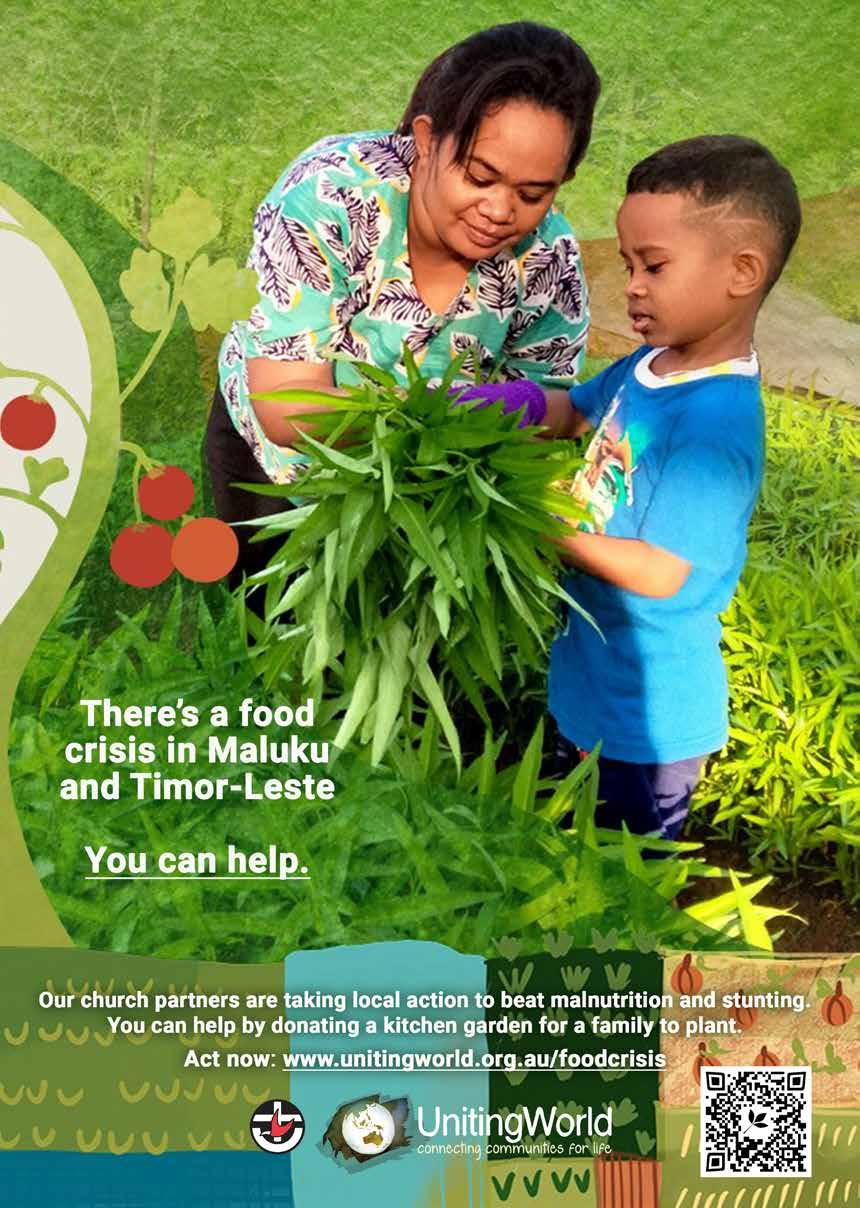ALL GOD 'SPEOPLE FORALLGOD'S PEOPLE FORALLGOD'SPEOPLE
The Uniting Church:


The Uniting Church:

S'DOGLLAROF ELPOEP ROF LLA ELPOEPS'DOG
SYDNEY: St Stephen’s Uniting
MELBOURNE: Wesley Church
AMY-JILL LEVINE



Rabbi Stanley M. Kessler Distinguished Professor of New Testament and Jewish Studies, Hartford International University for Religion and Peace University Professor of New Testament and Jewish Studies Emerita, Mary Jane Werthan Professor of Jewish Studies Emerita, Vanderbilt University
STAN GRANT

Vice Chancellor’s Chair of Australian/Indigenous Belonging at Charles Sturt University




 GENERAL SECRETARY
GENERAL SECRETARY
WELCOME
I can’t claim to be any sort of football fan, so I confess to being mostly oblivious to the Women’s FIFA World Cup contest. However, I noticed as the Matilda’s made their way through the early rounds that the level of excitement and anticipation grew with each win.
The only reason I noticed was that random people – strangers even – began talking to me about football assuming a shared interest and wanting to share the collective joy and hope about the team’s prospects. And yes, I did end up watching the second half of the quarter final against France and shared the general excitement over the win.
That experience got me thinking about other occasions when collective joy becomes evident. For many people, sporting events are the obvious example but there are others. I have a very fond memory of a Neil Diamond Hot August Night Concert at Sydney Showground with my mother (a fan) when the whole audience joined enthusiastically in the chorus of Cracklin’ Rosie. It was a really good feeling to be singing loudly and joyfully in that crowd and we took some of that spirit home with us that night. Total strangers can sing joyfully together and become less ‘strange’ to each other for a time. There is another side to this coin as well. I remember the collective grief and pain that erupted over the Lindt café siege some years ago and the mountain of flowers that grew in Martin Place. I got the sense in the days that followed that people needed to gather together, to share their confusion, grief and fear, and to be simply present to each other – a ministry of presence, bearing witness together – again, total strangers becoming less strange to each other.
And there is a dark side – witness the 6 January 2021 attack on the US Capitol Building and the subsequent riot following the US election. Collective anger is a dangerous, frightening thing and, in my view, actually turns people into strangers.
The willingness to be present to strangers in their joy and their pain is a defining characteristic of the ministry of Jesus Christ. There are so many examples – here’s a couple:
• The story of the Canaanite woman (Matthew 15:21-28)
• The story of the Gerasene (Mark 5: 1-20)
There are plenty of other examples – look and listen for them. The church, however, hasn’t always done this well and has to acknowledge a shameful history of ‘othering’ – making strangers – of people and groups. Unimaginable horrors like the Crusades perpetrated against Muslim sisters and brothers in the distant past; historic exclusions made on the basis of gender, sexuality or ability; not to mention the subtle exclusions practiced in many congregations (says she from painful experience).
Despite this horrible history and despite our best efforts to resist welcoming the stranger, the Spirit continually pulls, pushes, and provokes the church into practicing the radical inclusivity of Jesus Christ. In the UCA, we can point to the founding commitment to the mutual ministry of women and men, to the Covenant with Congress, to being a multicultural church and, most recently, to marriage equality. All these worthy commitments will inevitably and always be works-in-progress – without constant vigilance and deliberate intention, they aren’t anything more than words.
In the increasingly polarising world in which the church is called to bear witness, there are a couple of questions worth pondering:
• What more can we do to live into the grand commitments we’ve made?
• How do the things we do, the things we take for granted, foster connection or disconnection, inclusion or exclusion?
At its best, the church celebrates and shares in collective joy wherever it erupts. Similarly, it shares in the collective pain as it reaches out to victims in prayer and service.
It is a simple recognition of our common humanity and the particular, peculiar hope that the church has in the presence and promise of God living as we do ‘between the time of Christ’s death and resurrection and the final consummation of all things which he will bring’ (Basis par.3)
In 1985, the Uniting Church’s fourth assembly declared itself a multicultural church. Nearly 40 years later, Insights looks at this commitment.

The Uniting Church in Australia is one of the country’s largest denominations. Our vision is that it will be a fellowship of reconciliation, living God’s love, following Jesus Christ and acting for the common good to build a just and compassionate community of faith.


MANAGING EDITOR Jonathan Foye | PRODUCTION/DESIGN Rana Moawad | EDITORIAL/ADVERTISING/DISTRIBUTION ENQUIRIES: Insights, PO Box A2178, Sydney South, NSW 1235 | insights@nswact.uca.org.au | www.insights.uca.org.au
without

Commonwealth of Australia 2023.

Dear reader/Insights,
I’m writing to you in regards to your magazine, Insights. I recently came across a copy and wanted to tell you how much I enjoyed reading it (Autumn 2023 issue).
There are lots of interesting articles and stories, all with uplifting messages of hope and faith.
I have found this to be helpful as I’m currently going through a very difficult period in my life and anything that can help to uplift and give courage and strength in this troubled world has to be good.
I understand your religious denomination is Uniting Church and I am Catholic, and while I don’t know very much about the Uniting Church, I know we all share the belief in God and the Bible and follow the Christian Scriptures.
I have to confess that it’s only now that I’m older that I’ve learnt the real importance of our faith and spirituality and this is what will carry us through in life, especially in our difficult time. This is a big lesson to learn and I only wish I knew this much earlier, as it may have made a difference, a profound difference.
However, perhaps we can only learn things when we’re ready and open to do so, all to do with timing I think, would you agree?
It's really hard to have any definite direction when your faith and beliefs are fragile, and as the saying goes, “If you don’t believe in something, you’ll fall for anything.” How true that is, so true!
I really liked your Easter message in the Autumn edition of Insights. I agree it’s a time of deep reflection and deep gratitude for all we have as too often we take everything we have for granted, including people and each other.
I know I have done this, perhaps it’s part of being human and we’re not as enlightened as we like to think we are.
In fact, I don’t think the human race is enlightened at all, except for a very small minority who are indeed rare.
I think our main focus should be on ourselves and becoming better people as you can’t change anyone else and we all have our own journey and lessons to learn.
I also really like Rev. Simon Hansford’s article and he talks about silence. If only we can be silent, we can really listen to God.
You wouldn’t think this would be such a challenge but in our noisy world, it really is a challenge and we have to make a real effort to tune out and to be silent. I admit I’ve been afraid of silence like most people, and we fill it up with distractions to avoid the painful silence.
I was talking to my sister on the phone the other day and she’s a “big talker” but there were a few times when we both went silent (which is unusual for her as she always talks a lot) and I felt somewhat uncomfortable but I stayed with it and I could tell she was uncomfortable too. I often wonder why this is?
I think we’ve been conditioned and brought up in noise and distractions and we think that silence is abnormal instead of the other way around.
As Rev. Hansford states, we have information overload now with all the technology and it’s all constant distractions 24/7.
I might finish up for now and thankyou for the opportunity to read such a wonderful publication.
I’m not sure how long ago you started up the magazine but please keep up the great work and I look forward to your reply. God Bless
CARMEL VOTANO BRADBURYWE’VE ROUNDED UP THE BEST COMMENTS THAT YOU’VE LEFT ONLINE. If you would like to leave a comment on an article or have a viewpoint to sharejust go online insights.uca.org.au and leave your comments.
IF ONLY WE CAN BE SILENT, WE CAN REALLY LISTEN TO GOD
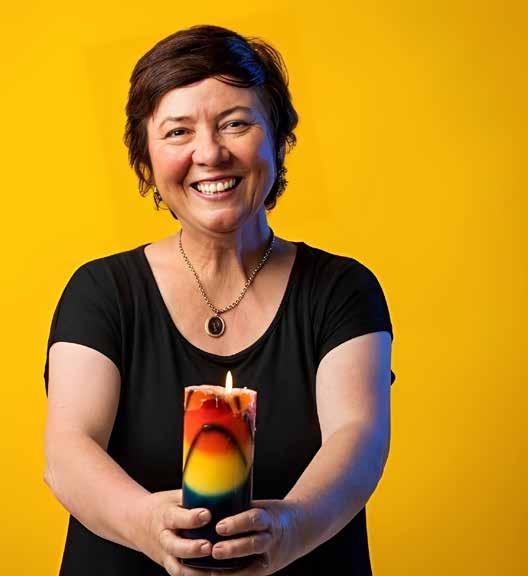
On Sunday, 25 June, Julie McCrossin was part of Leura Uniting Church’s Open Day celebrating the 46th anniversary of the Uniting Church’s formation.
Ms McCrossin was asked to give a testimony about her faith during the morning service. She told Insights this request made her think about what was important to her.
“For me, the parable of the Good Samaritan is the guiding principle of my life,” she said.
“And I shared how important the people in my parish at South Sydney Uniting Church are in my life. Their fellowship is how I connect to God.”
“I spoke about the people and experiences that have helped me turn my faith into progressive action. It was great to hear so many thoughtful questions and reflections in response.”
Rev. Myung Hwa Park is Leura Uniting Church’s minister. She said the congregation planned the Open Day to celebrate their mission and ministry with the broader community.
“Our goal for the Open Day was to share Uniting Church’s journey as a pilgrim people,” Rev. Park said.
“We first thought about our Mountain community when planning the Open Day and who to be the speaker.”
“We thought Julie McCrossin would be the right person for our community.”
“Julie was delighted to be invited to celebrate with us and to speak. She was extremely generous to come
THE PARABLE OF THE GOOD SAMARITAN IS THE GUIDING PRINCIPLE OF MY LIFE
from Adelaide to celebrate with Leura Uniting Church.”
Leura Uniting Church prayerfully entered the journey to becoming an Open and Affirming Church in time before the Open Day.
“To prepare for the Open Day, Leura Uniting Church also took a step toward becoming an “Open and Affirming Church” so that we are prepared for the community’s response, if there is any,” Rev. Park said.
Rev. Park said the Open Day brought Leura Uniting Church “an unexpected harvest” and that several new people have since joined the congregation.
“It was encouraging and inspiring to visit Leura Uniting Church to help celebrate the birthday of the Uniting Church in Australia,” Ms McCrossin said.
JONATHAN FOYE
Content warning: This article contains discussion of suicide.
Lifeline celebrated 60 years in operation on 16 March 2023 with a service at Wesley Conference Centre.
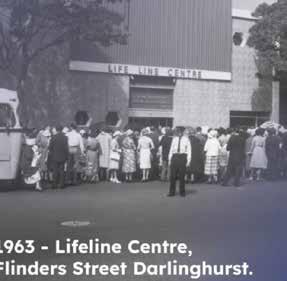
Established by the late Rev Sir Alan Walker, the former Superintendent of Wesley Mission, Lifeline supports people who are struggling with suicidality.
Rev. Stu Cameron is Wesley Mission CEO and Superintendent. He said Walker knew with compassion and connection there was hope.
Eastwood Uniting Church recently extended its arms to embrace young international students into their Game Club. These students have embarked on their educational journey, far from their home enrolled in high school from year 10 to year 11. At Eastwood Uniting Church, Game Club is a weekly gathering that ushers in a sense of camaraderie and joy every Sunday. It is a program to connect the wider community to play games with people from different cultures, with different generations joining in. The enchanting world of board games, video games, and the timeless allure of Mahjong unite people separated by language through the universal language of fun. The church members recognised that these young scholars have ventured to a foreign land away from their families, to seek education and opportunity. They sought to bridge the gap with a simple, yet profound gesture – a hot pot welcome dinner in order to extend their care and friendship.
Jermaine Yan, a member of the church, voiced their collective sentiment; “As we know these students come to study in Australia alone, we are trying to make them feel warm while they are away from their parents. Some of us used to be overseas students, we definitely know that feel and need.”
The hot pot dinner, a cherished tradition in the students’ home country of Hong
Kong, provides a sense of familiarity that transcends borders.
While residing with local host families, these young scholars may miss out on this cultural tradition, but the Eastwood Uniting Church took it upon themselves to ensure that these students feel cherished, and indeed, at home.
“Hot pot dinner is very common, especially during winter in their home country, Hong Kong. However, they may have no chance to enjoy it if they stay with a local host family. We organise this event to make them feel like they are at ‘home’. Eastwood Uniting Church can be their home during their stay in Australia,” Jermaine Yan said.
Beyond the warm and nourishing meals, what truly shines through is the Eastwood Uniting Church’s vision for a multicultural ministry.
READER COMMENT:
"Wow, what a fabulous outreach. Eastwood was my home church from birth till I was married and that was, of course, at the Eastwood Methodist Church. That was 53 years ago now and we continue to be regular worshippers with Garden Suburb Uniting being our home church."
SUE PEPPER (NEE HORSBURGH)
“Rev. Alan Walker realised the power of the telephone to connect people launching the world’s first telephone counselling service, Lifeline, in Sydney’s Darlinghurst on March 16, 1963,” Rev. Cameron said.
“Sixty years on, Lifeline has become an international movement that saves countless lives. Wesley Mission’s Lifeline Sydney and Sutherland volunteer crisis supporters are available 24 hours a day to listen, without judgement to any person in Australia who is feeling overwhelmed, experiencing crisis or longs to be heard.”
“We have a long history in this field, having birthed the Lifeline movement 60 years ago and establishing Wesley LifeForce, a national suicide prevention program supporting community action groups and training in 1995.”
Lifeline, the world’s first telephone counselling service, was established in March 1963.
The highest number of calls in the service’s history was received on 19 August 2021 – 3,505 calls in a single day. In 2022 Lifeline Online Chat becomes a 24-hour chat service under the banner of Lifeline Digital.
JONATHAN FOYE
If this article brings up issues for you, help is available. Lifeline operates the 13 11 14 telephone line with 41 centres around the nation as well as 24/7 text (0477 13 11 14) and 24/7 webchat available here: www.lifeline.org.au/crisis-chat
ADITEE VORA
THEY SOUGHT TO BRIDGE THE GAP WITH A SIMPLE, YET PROFOUND GESTURE
More than a 1000 people gathered for the 2023 Tongan National Conference in Katoomba in the Blue Mountains from 9 to 11 June.

A variety of different programs that catered for young and older audiences, running in both Tongan and English languages. The weekend provided the opportunity for community and congregational members to share the opportunities and challenges that face them through being part of the multicultural and intercultural Uniting Church.
Special guests included Tongan leaders, Rev. Charissa Suli, President-Elect of the Uniting Church, and Rev. Mata Havea Hiliau, Moderator-Elect of the NSW and ACT Synod. Moderator of the NSW and ACT Synod, Rev. Simon Hansford led opening and closing services for the event.
The Tongan National Conference was the first of the 12 national conferences of the Uniting Church formed in June
As part of the mission and ministry of the Uniting Church in NSW and the ACT, the Uniting Board is implementing an ambitious social justice agenda to better serve the most vulnerable people in the community, and is seeking to identify potential Non-Executive Directors to join the Board in 2023 and 2024 to support its succession process.
All board members are required to demonstrate capacity and willingness to operate within the ethos and values of the Uniting Church, a commitment to fiduciary requirements and relevant experience and literacy in finances, accounting, risk management and Board governance. responsibilities, having regard to the size and complexity of Uniting.
1987, two years after the declaration of the Uniting Church by the meeting of the Assembly in 1985 as a ‘Multicultural Church.’ Initiated by Rev Dr John Brown from the Assembly and the then President of the Free Wesleyan Church of Tonga, Rev. Dr Sione ‘Amanaki’ Havea, it was a gathering for fellowship for some of the leaders of and to teach Tongan congregations of the Uniting Church.
The Tongan National Conference continues to play its roles to the Tongan congregations of the Uniting Church and keeping the relationship with the Free Wesleyan Church of Tonga alive with people going to Tonga and back with connections in touch with the home church.
JO MALONEYThe Uniting Board is seeking expressions of Interest from experienced non-executive directors with expertise, capability and experience in one or more of the following key areas:
• Experienced CEO / Senior Executive or Board Director in the for-purpose and/or community services sector with a deep appreciation of social justice / community impact, ideally from a church / faith-based perspective.
• Financial and commercial expertise, ideally at CFO or Partner level, with the ability to understand complex finance structures, balance sheets and P&L statements. Experience as a member/chair of Audit, Risk and Treasury Committees would be highly regarded.
• Significant property development experience with exposure to the management of large-scale capital projects as well as innovative funding and asset management strategies. Exposure to the aged care /retirement living sector will be highly regarded.
• Qualified and contemporary clinical governance practitioner with deep experience in clinical risk management/clinical safety and the ability to support clinical governance best practice across aged care, health (specifically mental health and rehabilitation) as well as in the context of regulated children’s services.
• Highly experienced technology executive with a contemporary understanding of digital business models, ideally with an understanding of the application of technology and innovation in large complex organisations.
• Deep understanding and experienced in developing and leading the delivery of human service programs and policies with respect to Aboriginal and Torres Strait Islander people and having the respect of a wide range of Indigenous leaders and organisations.
• Qualified legal practitioner with significant experience at Partner/ Senior Executive or Board level.
Expression of Interest should be sent to boardsearch@hattonneale.com.au by 4 September 2023. Please attach your resume to this email and include the subject line: Uniting Board - Expression of Interest
Blue Plaques NSW celebrate people and events that shaped a particular community, town, or field of work or study. Twelve new Blue Plaques are being installed in NSW. They join the 18 already in place.
The Blue Plaque at Ashfield is fixed on Uniting’s Quong Tart aged care facility. It was originally known as Gallop House, which Quong Tart built in 1890 as a home for his family. He lived there until his death in 1903.
Quong Tart ran tea rooms across Sydney and worked to combat anti-Chinese sentiment. He provided meals to the disadvantaged and supported the arts by hosting concerts and exhibitions.
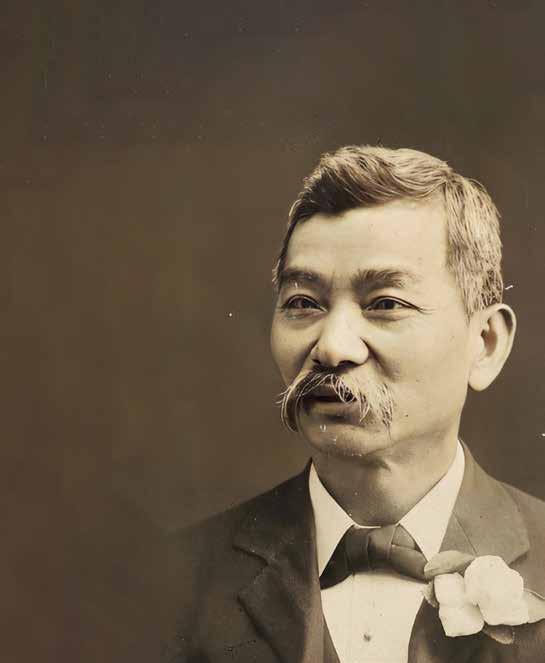
Penny Sharpe is NSW’s Minister for Heritage. “I am proud that we have a Blue Plaques program in NSW that celebrates diversity and encourages people to learn about historical
United Theological College has announced that Ernst M. Conradie will deliver the 2023 May Macleod Lecture.
The lecture, an annual tradition, will take place on Tuesday, 12 September.
Dr Conradie is senior professor in the Department of Religion and Theology at the University of the Western Cape in South Africa. He works in the intersection between Christian ecotheology, systematic theology and ecumenical theology.

UTC Principal Rev. Dr Peter Walker told Insights that Dr Conradie was well suited to deliver the lecture.
moments and stories that shaped the state,” Ms Sharpe said.
Saviour Buhagiar is Uniting’s Director of Seniors Services. “It’s very exciting for our residents and staff to know Quong Tart’s legacy is being recognised as part of Sydney’s rich cultural and historical heritage,” he said.
“Like Quong Tart, Uniting has a long history of supporting some of the most disadvantaged and marginalised people in our community and we celebrate diversity and welcome all people regardless of their ethnicity, faith, sexual orientation or gender identity.”
For more on Quong Tart and the people behind other Blue Plaques, visit the Blue Plaques NSW Website, https://blueplaques.nsw.gov.au
“Ernst was a very early contributor to theological and biblical resources for Christians concerned about our impact on the planet, and has remained engaged with his issue throughout his career,” Rev. Dr Walker said.
“There are literally dozens of articles and books by Ernst available in our library. It is an indication of his standing that many studies have been written on his work and only last year I supervised a Master’s thesis that included an excellent section on Ernst’s writing about sin and climate change.”
The May Macleod lecture is an annual event that first began in 1989. Named for the late May Macleod (1913-1984), the lecture aims to bring theological insights to the wider church and to celebrate the church’s ministries.
Prior speakers include Dr Meredith Lake in 2021, Professor John Swinton in 2020, and Rev. Dr Sathianathan Clarke in 2017.
The 2023 May MacLeod lecture takes place at the Centre for Ministry on Tuesday 12 September at 7pm.
JONATHAN FOYEQUONG TART WORKED TO COMBAT ANTI-CHINESE SENTIMENTUniting’s Quong Tart aged care facility now features a Blue Plaque commemorating historical figure Quong Tart and his advocacy and charity work in the 1800s.
The first in-person NSW and ACT Synod meeting since the COVID pandemic began will take place from 15 to 18 September. The meeting will be held at the Katoomba Christian Convention Centre. The growth agenda will be a major theme for the meeting. In 2019, the Synod agreed to prioritise growth in impact, number, and discipleship, and the 2023 meeting will seek to renew this commitment.
The Synod meeting will consider eight proposals. Topics range from gambling reform to raising the age of criminal responsibility from 14 years old as is currently the case in NSW and the ACT.
The Synod’s Director of Mission Glen Spencer will introduce a paper on the subject of church planting. According to Rev. Spencer, the paper will invite the Uniting Church to increase efforts in encouraging, supporting, and resourcing church panting across NSW and the ACT.
“Church planting as such is not the work of an organisation, it is the work of the Spirit,” he previously wrote.
“However, God invites those of us who are called to serve the organisational life of the church, through its various inter-related councils, to prayerfully and proactively join in God’s mission to create the organisational culture and practical pathways, systems, and resources by which new expressions of the church can be seeded, take root, and ultimately flourish.”
Among other things, the proposal calls for four to five
new churches to be planted in key growth areas. This will include ministry teams (rather than solo planters) looking to grow an expression of worship, witness and service within these areas.
“There has been a growing sense that looking to resource a single new congregation each year is simply not going to provide the momentum required to catalyse a culture of Church Planting and revitalisation within the Uniting Church,” Rev. Spencer said
“The working group are convinced that what is required is a cohort of Strategic New Congregations that are clear in their call to become Resourcing Congregations for the wider church.”
Rev. Alimoni Taumopeau will introduce another proposal.
“We are proposing for the Synod to commit to live cross culturally as a multicultural and intercultural church,” Rev. Taumopeau said.
“Living cross-culturally as a multicultural and intercultural church can contribute significantly to building a contemporary, courageous, and growing church in several ways.”
“By living cross-culturally as a multicultural and intercultural church, you create an environment that embraces
GOD INVITES THOSE OF US WHO ARE CALLED TO SERVE THE ORGANISATIONAL LIFE OF THE CHURCH, THROUGH ITS VARIOUS INTER-RELATED COUNCILS, TO PRAYERFULLY AND PROACTIVELY JOIN IN GOD’S MISSION
diversity, promotes inclusivity, fosters unity, and connects with the wider community. These qualities contribute to the growth of the church by attracting new members, promoting understanding, and empowering individuals to make a positive difference in the world.”
Rev. Dr Rob McFarlane will present a report on the Presbytery Project.
He told Insights that the report has three parts, “A look in the mirror. A gaze in the crystal ball. A path forward.”
“The mirror shows us who our presbyteries are, in all their
Rev. Hiliau will be installed into the role the day before the Synod meeting begins on Thursday, 14 September. The installation service will take place at St Stephen’s Uniting Church at 197 Macqurie Street.
Previous Moderator Rev. Simon Hansford’s tenure was extended at the 2019 Synod meeting.
Mark McCrindle will deliver a keynote address about Generation Alpha and the future of the church. Mr McCrindle is a best-selling author, social commentator, TEDx speaker, and the Principal of McCrindle Research.

diversity, including strengths and challenges,” he said. “The crystal ball gives us some ideas of models of presbyteries across NSW and the ACT. The path helps us engage in a year of discernment through 2024 to find our preferred future for mission-focussed, disciple-making, heathy and sustainable presbyteries into the future.”
Uniting Creative will showcase some of the songs from their upcoming album, which will be officially launched in October (For more on Uniting Creative, turn to pages 30 to 31).
The Synod meeting will be the first one with Rev. Mata Havea Hiliau as Moderator.
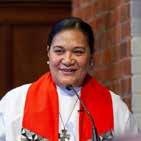

Uniting Theological College’s Rev. Dr Seforosa Carroll and Dr Alexandra Robinson will deliver daily Bible studies. Some parts of the meeting will stream online, including Mark McCrindle’s keynote address, and the report from General Secretary Rev. Jane Fry.

The 2023 Synod meeting will take place at the Katoomba Christian Convention Centre from 15 to 18 September. Insights will have full coverage on our website. The next print edition will also feature some coverage.
JONATHAN FOYETHE SYNOD MEETING WILL BE THE FIRST ONE WITH REV. MATA HAVEA HILIAU AS MODERATOR
Over 75 gathered together on a beautiful day at Gerringong Uniting Church for the Illawarra Presbytery gathering recently. Rev. Josh McPaul was the special and very inspirational speaker on the topic “Saved by Hospitality”. The opportunity was given for those present to see the recently restored buildings three of which have Heritage listing. The generous offering was given to the Flying Padre David Shrimpton. Five members of the UCAF NSW/ ACT Synod Committee attended. At Morisset Uniting Church 100 gathered for the Hunter Presbytery Gathering including 10 UCAF NSW/ACT Synod Committee members. Special guest was Pastor David Shrimpton who proved a wonderful and entertaining speaker. Some of those present even had to be passengers in a mock flying demonstration with him.
After lunch we were entertained with a wonderful fashion parade using items from their very successful Op Shop. Generous donations of knitted blankets, scarves, beanies, and wool were divided amongst local Hunter refuges and homeless centres with some also going to Pitt Street Uniting Church for distribution. The very generous offering plus donation from Brunkerville Uniting Church meant nearly $2000 went to The Flying Padre David Shrimpton. Both Gatherings were wonderful times of fellowship and sharing together.
East Maitland UC hosted the first Retired Ministry Persons lunch in over three years at the end of August. Rev. Graham Perry, Hunter Presbytery Minister led the gathering. This is always a great time of catch up and Fellowship and celebrating milestones.

UCAF National Chairperson
Margaret Pedler has been slowly travelling down the East Coast after attending the Lay Preachers Conference in Brisbane. She visited Lismore Uniting Church which suffered badly in the 2022 floods. She was in time to see the very recently opened Op Shop and Red Dove Café. The church repairs are still on-going. At Taree UCAF NSW/ACT Synod Committee members and Margaret joined 25 people from Taree, Foster/Tuncurry and Beechwood churches for morning tea provided by the Red Dove Cafe at Taree UC. It was a wonderful time of sharing and fellowship.
At the last NSW/ACT UCAF Synod Committee meeting (by Zoom) we welcomed Estelle Crabb from Kingscliff Church (Far North Presbytery) to our committee. Canberra Region, Paramatta-Nepean and Sydney Central Coast UCAF Presbytery meetings have disbanded. We thank those who have faithfully served over many years.
The National UCAF Committee has also asked for a data survey to be sent out fact finding about groups and activities in church congregations. This was in the last Connexion newsletter.
The UCAF National Gathering forms are available from Secretary Laraine Jones. The event will be held from Monday 22 to Saturday 27 January 2024 at Nunyara Conference Centre Belair South Australia. Early Bird Registration of $495 is due 15 November 2023. Full rate $510 with final closing date for registration 15 December 2023. Cost covers all meals, accommodation and gathering materials. Full Day packages are also available at $132. Contact Laraine: laraine.jones@ bigpond.com for registration details.
The Stamp Committee continues to welcome donations of used stamps. Email uniting.stamps@gmail.com for drop off locations. Over the counter sales of stamps continues despite the Auction House not opening till later in 2023.
For more information visit the Synod website at: www.nswact.uca.org.au/ get-involved/the-stamp-committee Appreciation Certificates for 80, 90 and 100 year olds: Contact Laraine Jones.
If you would like to share your fellowship news or have any questions, please contact Judy Hicks: judyh_rnh@hotmail.com
IT WAS A WONDERFUL TIME OF SHARING AND FELLOWSHIP


There’s a food crisis in Timor-Leste and Maluku, two of the poorest places in our region.
Malnutrition, particularly among children, has been a long-term problem in TimorLeste and Maluku (East Indonesia) and now there is a hidden hunger crisis being made worse by the rising cost of living, global conflict and climate change.
In Timor-Leste, the prevalence of stunting, impaired growth and development caused by malnutrition, in children under five is 47 percent, among the highest in the world. In Maluku, 34 percent of children under five are stunted.
In both places, a nutritious diet is increasingly unaffordable for most households.
Russia’s invasion of Ukraine has made things worse; reducing wheat production, wrecking supply chains and inflating the price of food imports.
Ukraine and Russia have historically been Indonesia’s main suppliers of wheat (a key ingredient for noodle, flour, and bread producers) and Timor-Leste imports most of its food from Indonesia, making it extremely vulnerable.
Experts say the global food situation is set to worsen with the ongoing conflict and will continue to hit the poor the hardest.
We asked our partners how we could best help, and they told us they had a sustainable, local solution to the crisis. Gardening!

Hundreds of families growing their own food right where they live.
New Director of our partner FUSONA*, Julio Da Costa is passionate about
equipping families to tackle the food crisis themselves.
“The main objective is for every family and community to have the opportunity to produce their own food to eat and improve their health. And if they want to earn an income they can plant extra to sell,” said Julio.

“People will apply their own time and energy to generate their food and income. We will provide seeds, equipment, and education, and accompany families at every step of the way.”
Julio also says part of the project will be to educate people about the importance of good nutrition and sanitation, along with giving them an alternative food source.
“So far, we’ve been successfully growing sweet potato, eggplant, spinach and green mustard… people have been coming to the church to learn more and join in,” he says.
“Through the hard work of FUSONA and other NGOs doing similar work I believe we can impact thousands of lives with this approach and reduce malnutrition for children in Timor-Leste.”
We’ve launched an appeal to support our partners in Timor-Leste and Maluku to tackle the food crisis and help ensure as many children as possible do not go hungry.
You can find out more about their projects and donate at: www.unitingworld.org.au/foodcrisis
A NUTRITIOUS DIET IS INCREASINGLY UNAFFORDABLE FOR MOST HOUSEHOLDSCELEBRATING A SUCESSFUL PROJECT


In 1985, the Uniting Church’s fourth assembly declared itself a multicultural church. Nearly 40 years later, Insights looks at this commitment.

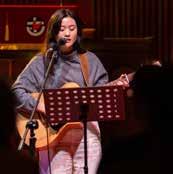
Has the church lived up to its words? And what challenges are there for a denomination that truly embraces diversity?




The Uniting Church’s fourth Assembly meeting adopted a vision statement called ‘A Church For All God’s People.’

The latter part of statement’s introduction reads, “The diversity we have in the body of Christ is God’s gift to us. Learning to understand one another and celebrate our differences is both a joyful and painful journey. We seek to be a community that is open to welcome one another as Christ has welcomed us.”
Being a multicultural church is a calling that provides benefits but comes with its challenges.

Rev. Myung Hwa Park is a former Moderator of NSW and the ACT and the current minister at Leura Uniting Church. She recalled that the 1985 Assembly’s declaration was “a courageous act.”
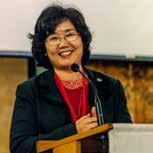
“This declaration gave a welcoming message for diverse cultural groups to make their new life within the UCA.”
The commitment the church made, she said, was a widespread one, with more implications than merely acknowledging cultures.
“Being a multicultural church means more than welcoming people from other cultures but a Gospel imperative; transcending cultural and other barriers,” Rev. Park said.
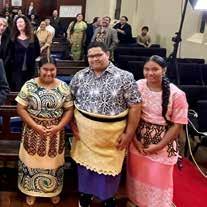

“Being a Multicultural Church is not a decorative statement of what we are: how many migrant congregations we have, or how many CALD ministers work in the UCA.”
“Being a Multicultural church is a missional statement of who we are; the church wants to celebrate and learn from our differences, whether cultural diversities, theological differences or different structures.”
Rev. Alimoni Taumoepeau is the Mission Enablement Team Leader for Uniting Mission and Education. At this year’s Synod meeting, he will introduce a motion calling for the church to live cross-culturally (see this issue’s news section). Rev. Taumoepeau told Insights he believed that the Uniting Church had much to gain from this approach.
“In a contemporary context, where societies are becoming increasingly diverse, having a multicultural church also helps in reaching out to and serving the broader community,” he said.


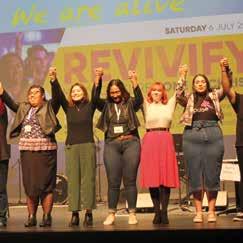
“By valuing and embracing different cultures, the church becomes a place that can truly connect and engage with people from various backgrounds. This relevance and inclusivity can attract more people to the church, contributing to its growth and expansion.”
“Living cross-culturally also requires courage and openmindedness, as it may involve challenging preconceived notions, biases, and stereotypes. This courage can extend beyond the church walls, inspiring members to take bold actions and engage in social justice issues to impact the world around them positively.”
As the 1985’s statement’s reference to a ‘painful journey’ suggests, there are challenges to working cross-culturally.
“One of the challenges that I saw is our inward-looking approaches to it,” Rev. Park said.
“Being a Multicultural Church requires us to respond to global responses on climate, environment, race, and economy and many more issues with the people who brought the world into our midst.”
Rev. Dr Sathi Clarke has over 30 years working in various intercultural ministries in India, the United States, and now Australia.

He told Insights that churches’ intercultural work often embraced the easier aspect of the ‘spectacle’ that came with multiculturalism.
“To celebrate the spectacle of the gathering of many cultures, that’s the easy part,” he said.
“We can come together during Pentecost.”
Genuinely working together, he said, was a more difficult task beyond this ‘spectacle.’
“The difficult part is to baptise ourselves into a new way of belonging,” Rev. Dr Clarke said.
“To sift and see in each of our cultures to see the life of the world.”
“We’ve all thought the only people who should sieve their own cultures was basically western cultures.”
Rev. Dr Clarke said the task the church faced was to, “Not judge each other’s cultures, but for each of these cultures to see the way we can see the way we have been curved into parochiality.”
“It is that baptism that will see us not just be a spectacle but truly work for the world around us.”
“Western monoculture tended to judge every culture except itself,” he said.
“We have a lot of catch up to do.”
Rev. Dr Clarke told Insights he was interested in Willie James Jennings’ work regarding “how do we get away from the work of assimilation to what is a new form of joining in the spirit that gives each culture their own way to join together into this body of Christ?”
“Jennings makes the point that while identity politics calls for assertion and world Empire promotes assimilation, the Holy Spirit invites us to a new kind “of joining…a life together and of shared stories bound to a new destiny in God.”
JONATHAN FOYEThe 1985 vision statement, A Church For All God’s People’ can be read online at the Assembly’s website: tinyurl.com/ucamulticulture
BEING A MULTICULTURAL CHURCH IS A MISSIONAL STATEMENT OF WHO WE ARE
Language shapes what and how we think, and who we sing and worship with. Our first language shapes the naming of our family, home, rituals, and our experience of the world. For many, it is the “heart” language in which we are taught to pray and learn about God. Our UC website tells us that around 45 languages, 15 of which are languages of our First Peoples, are used each week in our Uniting Church congregations, making language an important pastoral issue, not only in these multilingual churches, but also in English-only congregations.
A new book shines light on the languages of faith in Australia. Language and Spirit explores the relationships between people’s languages and their spirituality and religion. The book combines 36 short personal narratives from different faiths and languages with ten research studies examining people’s experience of language and faith.

Aboriginal and Torres Strait Islander contributors speak about the connection between their language and the spirituality of Country, the knowledge and stories of the language, and a greater experience of well-being. Michael Jarrett writes that “teaching Gumbaynggirr and telling stories is one of the best ways to learn and retain the language and culture…when I’m doing it I am connecting to my land, I’m connecting to my spirits, connecting to the creators and my ancestors”.
In this year of understanding the significance of the Uluru Statement from the Heart and Voice to Parliament, the book’s Indigenous narratives offer valuable perspectives: “it’s the best form of Reconciliation, learning about one another’s languages” says Aunty Diane McNaboe, Wiradjuri teacher.
Contributors from diaspora communities write about the languages they use within Islam, Hinduism, Buddhism, Judaism, and in the diversity of Christian churches. For all, language and spirit are about identity, belonging and faith community. Vietnamese Catholic Dich Muc Dao writes that “only my native language can touch my heart in spiritual practice. No foreign language can do that…the Vietnamese language is my heart language”.
Many churches, mosques, synagogues, and temples play a leading role in providing venues and passion for Community Language Schools, which 100,000 children attend every weekend. Contributors to the book have written about their great desire for their children to learn the family culture, religious identity and knowledge. Swati Doshi, Hindi teacher, writes that her languages
“give me my identity, keep me in touch with my culture and my ancestral roots, but are also the core of my religious and spiritual experience”. For Jaruslav Duma, “the Ukrainian Catholic Church and the Ukrainian community were effectively my second home. From the age of around four, I always prayed in Ukrainian as was taught by my mother”.
Contributor Susitina Suli writes that “the Tongan church community and language has a significant impact on how families work together, how people interact with each other and how communities engage…core values shape our identity…our language is sacred…to ensure that our identity and language will continue to flourish and will be shared with our emerging generations”.
For language communities that are fragile, the church is a vital location for speaking and hearing language. For Matagi Vilitama, “language is the canoe of the Nuiean culture…. the opportunity to speak it is minimal, as children are surrounded by English in all aspects of life, except church…to lose a language is to lose part of myself.”
Some contributors speak about the strong link they feel between language, wellbeing and mental health, well established also in research with Canadian First Nations people. Researcher Ghil’ad Zuckermann writes about the revitalisation of Barngala language (South Australia) and a relationship between first language knowledge and rate of youth suicide. Language learning also nourishes cognitive growth. Nathan Schreiber, a teacher of Gunggay language , Queensland, sees that in his young students “language is giving them identity and inner strength. I think the
better they learn language, the better they can learn other things too”. Contributors also describe how their language’s script has sacred properties and is a conduit to faith and history. In Arabic, for Abraham Ibrahim, “every single ‘huruf’ (letter) has not only meaning in itself but can be seen as a light”. Hebrew letters also have numerical values, deep spiritual meaning and connections to Bible stories and concepts.
Intercultural learning always involves exchange of perspectives, and growth in self-knowledge. English, with its crazy spelling, has absorbed linguistic influence from the Vikings, the Romans, the Normans, and in Australia, absorbs over five hundred words from Indigenous languages. But it can be hard for first language English speakers to stand aside and recognise their language as just one amongst many, and that truths can be expressed differently and beautifully in all languages.
In congregations and in the community, English learners can be struggling daily with the demands of educational, medical and immigration systems, and may be unable to access spiritual support. Korean contributor Sook Hee McRoberts writes that in her early years in Sydney, “my friends at the local church … found it hard to recognise the difficulties I faced… My difficulty with the English language and culture was not a major consideration for them. Not understanding the sermon and its lessons left me at a loss and feeling like an outsider”.
DR ROBYN MOLONEYLanguage and Spirit is available online, in paperback for $100 and on Kindle.
FOR LANGUAGE COMMUNITIES THAT ARE FRAGILE, THE CHURCH IS A VITAL LOCATION FOR SPEAKING AND HEARING LANGUAGE
On 21 May 2022, Anthony Albanese began his speech as newly elected Prime Minister of Australia by making a heartfelt promise to our First Nations people.
“I begin by acknowledging the traditional owners of the land on which we meet,” he told the nation. “I pay my respects to their elders, past, present and emerging. And on behalf of the Australian Labor Party, I commit to the Uluru Statement from the Heart in full.”
Fast forward nearly 12 months and that “patient, gracious call for a voice” continues to dominate discussion around the country.
In February, Albanese said he expected the country to go to a referendum before the year is out on whether that indigenous voice to parliament should be included in our Constitution.
The Uniting Church wholeheartedly supports a referendum yes vote and, in late February, President Rev. Sharon Hollis and Uniting Aboriginal and Islander Christian Congress Interim National Chair Rev. Mark Kickett launched the #Yes23 campaign.
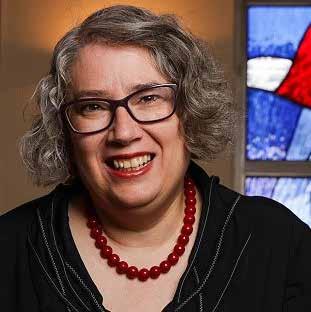
“This is an historic opportunity for Australia to acknowledge and honour First Nations people and their deep spiritual ties to this land and to walk together as a nation toward a better future,” Sharon says.
Mark says now is the time for Australians to unite in support of justice for First Peoples.
“The Uluru statement is an invitation given by First Nations people to the people of Australia,” he says.
“A constitutionally enshrined voice will shape and guide the relationship between First and Second peoples in this country by enabling our people to have a say in the decisions that impact our communities.”
As the discussion around a voice has continued, two indigenous Australians with strong ties to the UAICC and the fight for recognition for their people have watched on with great interest.
Uncle Vince Ross is a retired Victorian Uniting Church Minister, former UAICC
chairperson, founder of the Narana Aboriginal Cultural Centre in Geelong and, in 2006, was named NAIDOC’s Aboriginal Elder of the Year.
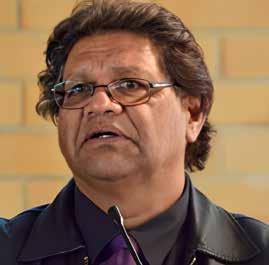
Alison Overeem runs Leprena, the home of the UAICC in Tasmania, is a former member of the Tasmanian Women’s Council, and in 2019 was added to the Tasmanian Honour Roll of Women for services to the community, education and training, and cultural heritage. They are, indeed, perfectly placed to offer their thoughts on a voice to parliament and what it might mean as part of a broader discussion about ongoing recognition for our First Nations people.
But, more than that, they have much to tell, and teach, us about what is expected from non-indigenous Australians, and if that means offering a few home truths along the way, so be it.
“I guess for many Aboriginal people we struggle to convince government that the only voice we hear loud and strong is theirs and it’s now time for our mob to be heard,” he says.
“Any partnership across communities comes about when people decide to make their voices heard and so here we want people to give us that voice in government.
“What I believe can come out of this yes vote for the voice is that government and community will realise we have a voice and want to be heard.
“Our mob will be able to assist in the locking in of policies that actually work and self-determination and selfmanagement will become a reality.”
Alison says an indigenous voice in our Constitution is a must, but there is a caveat: it needs to be part of a much wider conversation around justice, truth telling and a treaty.
“I speak into this space as part of the UAICC, as a proud palawa woman, and as a big part of the Tasmanian Aboriginal community, and I think it is a missed opportunity if we don’t have a voice,” Alison says.
“I really don’t want it to be just a voice to parliament, I want it to be voices and, as a collective, that’s how we should speak into the space.
Like Alison, Vince says a treaty would continue a journey towards selfdetermination for his people.
“There have been many written and spoken words about welcome and acknowledgement of country, reconciliation, the voice to parliament, black deaths in custody, juvenile detention, domestic violence and other issues,” he says.
“Government has for years struggled with these issues and tried many things but continues to fail.
“The answer lies within the Aboriginal people, if given the mandate through a treaty and not just a voice to parliament but a new structure that brings with it a self-determination model that sustained our communities for thousands of years.
In 1988, Prime Minister Bob Hawke made a political commitment at Barunga in the Northern Territory to a treaty as part of the journey towards reconciliation. Just four years later, Prime Minister Paul Keating delivered his famous Redfern speech and, in the process, accepted responsibility for Aboriginal loss, devastation and trauma.
Yet over 30 years later, indigenous Australians can rightly say there has been little movement. Alison says with reconciliation must come the process of truth telling.
“Let’s relook at that word ‘reconciliation’, because reconciliation assumes that there was something to reconcile in the first place,” she says.
“It also assumes that there was a relationship and I think we have overused the term ‘reconciliation’ more as a comfort to non-indigenous Australians than as justice leverage for First Peoples.
“Just because you have a reconciliation action plan sitting on your table doesn’t mean you know about us, so we need to reconcile with our own truth telling that sits with us within our education system and our family histories.
“I think non-indigenous Australians need to delve into that first and actually ask the question ‘what are we reconciling?’”
A recent trip to Alice Springs made Alison a firm believer that change will come through our younger generations.
“I think there’s a lot of goodwill out there, and in Alice Springs I was absolutely overwhelmed at the young people and their real passion to want to learn and know more about First Peoples history,” she says.
Vince admits to being a glass half full type of person and, with that in mind, believes Australians are big enough and mature enough to vote yes to an indigenous voice in our Constitution.
“It is my belief that even if the vote doesn’t get through we, as a nation, will be further down the track in having a greater understanding of our history that will bring us closer together,” Vince says.
Alison believes there are enough nonindigenous Australians wanting to create real change in the relationship with First Nations people.
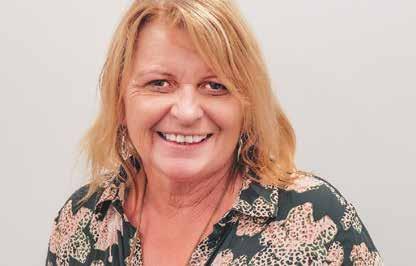
“I have actually been quite surprised and comforted by the amount of nonindigenous Australians that want to walk with us, particularly young nonindigenous Australians in the Uniting Church,” she says.
“I think we do have a long way to go but I have a long time to give to it.” And with a voice in place, says Alison, must come the process of healing.
“If there is healing in the voice, and if there is change in people’s thinking, perception and a real acknowledgment that a white Australia has a black history, this is the opportunity,” she says.
“But it’s not just an opportunity for nonindigenous Australians just to say, ‘oh, I’ve done something’,
“I was quoted the other day posing the question, ‘what happens the day after the referendum?’ “How do we keep Aboriginal voices at the forefront, not just in the back stalls.”
Vince has seen much in his long life and now sees in front of him a country with an opportunity to make a meaningful statement on behalf of its First Nations people.

He feels confident it’s an opportunity enough Australians will want to grasp when they come to tick a “yes” or “no” box at the referendum later this year.
“The word reconciliation speaks about a coming together and discovering our true history and having that capacity to be change agents throughout the wider community,” he says.
Alison has one final message for nonindigenous Australians.
“I’d tell them to sit, learn, listen and hear the stories of our old people, that’s who I’m guided by,” she says.
“I would want to ask what they don’t know and what they do know, then work from there because that’s how we learn.”
ANDREW HUMPHRIES
This piece first appeared in Crosslight.
A TREATY WOULD CONTINUE A JOURNEY TOWARDS SELFDETERMINATION FOR HIS PEOPLEALISON OVEREEM
Sanitation is something that missional gatherings rarely have to think about in detail. But not so for the Forest Advocacy Ministry, which holds most of its activities outdoors.
Last year’s Forest Advocacy Ministry field visit on Gumbaynggirr Country (Mid North Coast) included an opening event at Gleniffer Community Church, which has no toilet, and visits to forests.
The issue of toileting became a regular preoccupation at planning meetings.
“We spent a large amount of time talking about toilet logistics,” said Dr Miriam Pepper, secretary of the Forest Advocacy Ministry Committee.
“What sort we needed, where we would hire it from, how we would pay for it, who was going to collect it, where it would be stored, might it be stolen, who would tow it, would we need it for every activity, would the roads be suitable. We were pooped! And then at the field visit itself, the portaloo became the butt of many jokes. It went on and on!”
Now, thanks to a Mission Shaped Ministry seed grant, the Ministry can get to the bottom of the problem. The grant will pay part of the costs of a trailermounted composting toilet.

More environmentally friendly than a standard portaloo, the composting toilet will support regular missional gatherings at Gleniffer Community Church, particularly the monthly outdoor “Ecofaith” gatherings, which explore the life and teachings of Jesus and ecotheological resources, including e-scatology, and seek to encounter the God of life directly out amongst life.
The toilet will also be used at the upcoming Forest Protection Pilgrimage.
Logging is intensifying on Gumbaynggirr country, destroying critical habitat for koalas and other threatened species. The Forest Protection Pilgrimage, in the Bellingen area from 25 to 27 August, aims to:
Support “forest friends” groups who are protecting forests from imminent logging.
Increase awareness among Christians of the importance of achieving the maximum possible protection of koala habitat, and encourage their involvement in efforts to protect habitat and end native forest logging.
Foster friendship between Forest Advocacy Ministry participants and forest friends.
Provide opportunities for spiritual connection with the earth/Earth, focusing on forests and water.
Invite participants to experience and reflect on ministry in the context of the destruction of forests and community efforts to protect them.
The weekend will include a Welcome to Country and yarning, time with forest friends, a day pilgrimage through threatened forest, a public event drawing attention to the plight of the forests, an ecofaith outdoor gathering and more. All are welcome to attend.
The toilet will also be available to the many friends groups who are holding vigils, forest protection camps, and larger public rallies far from facilities.
“The Uniting Church affirms that all creatures and ecosystems have rights and that God’s Creation is good in itself, as well as in sustaining human life,” said Jeff Kite, chairperson of the Forest Advocacy Ministry Committee and a retired water resources engineer. “The churches are called to serve the ‘reconciliation and renewal of the whole Creation’ – that is, the healing and wholeness of Earth.
“The Forest Advocacy Ministry is committed to challenging the destruction of the forests and to standing alongside people who are doing likewise. Being responsible with our wastes is a part of that commitment.”
DR MIRIAM PEPPER

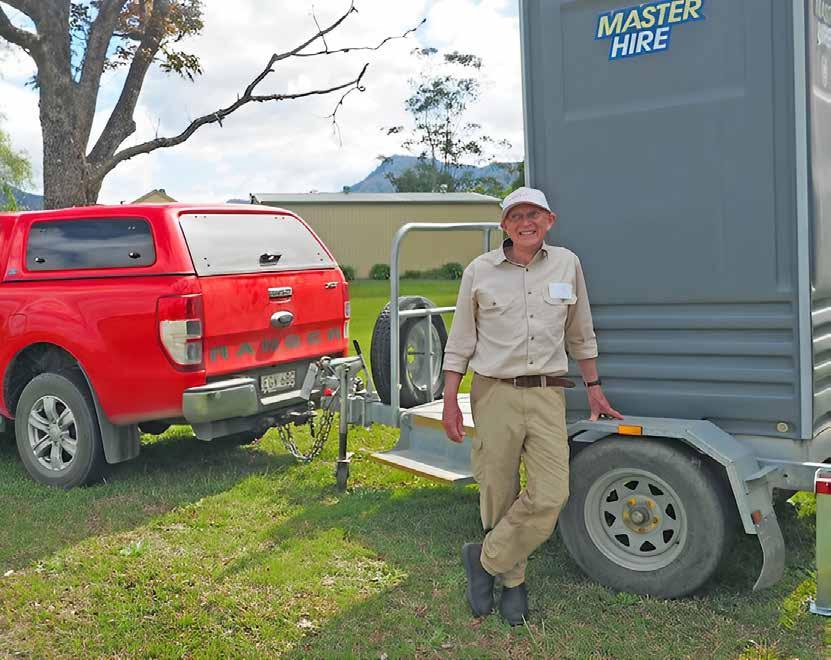


Singleness is far more common that at previous times in history. The church, however, has not always been a welcoming or safe place for single people, despite the fact that Jesus himself was single.
There are a number of social, theological and relational reasons for this.
Firstly, society has changed and single people’s place within it has shifted as a result. Single person households have increased, and lifelong singleness is far more common than in previous generations. If we look at the early 1970’s, 95 percent of women could be expected to have married at some point in their life according to marriage rates. That rate is much lower today considering the number of marriages in 2019 was less than in 1970. First time marriages are almost a decade later for men and women: 23 and 21 respectively in the early 1970’s, but 31 and 29 in 2019. Women are having children far later in life. In the 1970’s 93 percent of mothers would have their first child before 30 (including 18 percent before age 20). In 2021, 51 percent of new mothers were aged 30 and over. The fertility rate in Australia is falling, with only children and no children statistics growing. 36 percent of children are now born outside of marriage. Recent projections suggest that one in four women of reproductive age will not have children.
The church too, has experienced a pendulum swing in its relationship to marriage and singleness. When Jesus came, singleness was valued more, as Christ alone offered eternal life. Children and family were no longer as great a focus. Paul and the early church saw the practical benefit for ministry in being single, but over time the Christian church elevated singleness to a calling, and even required it of its male and female clergy. When the Reformation occurred, the Catholic Church was called out for its celibacy restrictions and the pendulum began to swing back towards marriage. By the mid-twentieth century, family was elevated in the Protestant church to such an extent that single people were viewed as someone to be pitied, that they were cursed, that something was wrong with them or even that they were engaging in sin and hence the reason they could not find a spouse.
The church today, for the most part, continues to hold to a family-centric model, with activities and groups planned around the family, children and young people. These can include playgroups, mother’s groups, Sunday Schools, family camps, and youth groups. This plays out in the statistics in our churches. According to the National Church Life Survey, the number of never married and divorced individuals in churches is half of that seen in the surrounding community. Single people often report feeling left out of the church’s vision and practice of community.
Secondly, church theology has not always been helpful around the nature and status of singleness. Dr Dani Treweek, whose PhD studies explored an eschatological view of singleness, notes that there have been some unhelpful, even destructive, ways of viewing singleness in the church by leading theologians. It has been expressed as an assault on marriage, a more sin-prone lifestyle, and a reflection of spiritual immaturity and selfishness, because God uses marriage as the main way to sanctify individuals.
1970 21 23
2019 29 31

Of new mothers were aged under 30 in the 1970's
Of new mothers were aged 30+ in 2021
Another problematic theological area is the concept of the gift of singleness. The gift of singleness has been understood to be a supernatural empowering of the Holy Spirit to “endure” singleness. If a single person has this gift, then the Christian life will be a breeze. If an individual has the gift of singleness, they shouldn’t marry. If they don’t have this gift, then they need to find a spouse because their singleness will be unendurable. There are a number of problems with this viewpoint. It minimises temptation that all Christians experience, not just those who are single. It is reliant on feelings which can change from one day to the next. This view also demeans singleness because it suggests that singleness is so bad that one requires special blessings and dispensation from God to be able to cope with it. It also creates a two-tiered system of singles – those who have the gift and those who do not. This is not a Biblical understanding of the gift of singleness. In 1 Corinthians 7 Paul states that both marriage and singleness are good gifts from God and neither one is superior to the other. It is the state of being that is the gift. A person starts off with the good gift of singleness and if they get married, they exchange it for the good gift of marriage. Inevitably, through divorce or death of a spouse, most married people will exchange that back for the good gift of singleness. Both states of being have problems and both have benefits.
Dani Tweleek offers a way of thinking about singleness beyond this world:
“The new creation is when we are going to be at our most wonderfully perfected, when we are going to know and be most fully known by God and by each other. If singleness, as a very broad description of not being married, is our eternal future, then that gives singleness in this life a certain dignity and purpose and significance, just as marriage has. In Ephesians 5, marriage is a profound mystery that points to this great heavenly truth that’s awaiting us.”
DR KATHERINE GROCOTTWHEN JESUS CAME, SINGLENESS WAS VALUED MORE, AS CHRIST ALONE OFFERED ETERNAL LIFE
Every five years, Australians everywhere wade through a mountain of paperwork as the Federal Government’s Census takes a snapshot of the country’s economic, social, and cultural make-up.
how accurate it is in terms of determining the identification of trends that are occurring in society,” Rev. Hughes said. So what do the Census figures tell us and what can we glean from them to help guide planning for the future?
They tell us, firstly, says Philip, that there has been a dramatic drop in the number of Australians who willingly identify as Christian.

with people in the 25 to 35 age group,” Rev. Hughes said.
“What happens is that young people grow up and the person who’s filling in the Census about them in the household describes them as sort of Anglican or Uniting Church or whatever, and then when they are old enough to fill in the Census themselves, they put down ‘no religion.’”
For the Uniting Church, the Census statistics paint a sobering picture.
The decline in the Uniting Church is one of the fastest
rapidly, whereas the more mainstream churches have tended to decline much more rapidly,” Rev. Hughes said. The trend towards personal fulfilment is one Rev. Hughes also says needs to be considered when considering the role of religion in contemporary Australian society.
“’You do you’ is almost the expression of our time,” he said.
“It is up to the individual to decide for themselves how they seek to be understood, and this then extends to religious faith and expression.

“We live in a context of a ‘multifaith and no faith’ milieu.”
Former Uniting Church
Minister Rev. Philip Hughes has become a “Census Detective”, as he takes a deep dive into what the data tells us about religion and its place in Australia.
His latest publication, ‘Australia’s Religious and NonReligious Profiles: An Analysis of the 2021 Census Data’, was launched at the end of March and provides a timely insight into the changing face of faith in modern Australia.

“There is definitely useful material in it because of how broad it is, and therefore
“What’s happening across the board is that the percentage of people identifying as Christian has declined significantly,” he said.
“It was 61 per cent of the population in 2011, and it had dropped to 44 per cent by 2021.”
If there has been a significant drop in those who identify as Christian, the next question, then, is how concerned by this should we be?
“We’ve seen the drop occurring over the years and it has been occurring mostly
among the denominations, and between 2011 and 2021 across Australia, there was a fall from just over one million members to less than 700,000, a drop of 37 per cent.
“A number of denominations, such as the evangelical and charismatic churches, have not declined so

“What it raises for the more open and liberal progressive churches, like the Uniting Church, is a question of what is it that we offer society which they don’t necessarily find elsewhere?” he said.
“On the other hand the question then becomes, what is the attraction, and I think it’s not that people sort of reject the Uniting Church, it’s more that they don’t find sufficient reason to actually go to it.”
THERE HAS BEEN A DRAMATIC DROP IN THE NUMBER OF AUSTRALIANS WHO WILLINGLY IDENTIFY AS CHRISTIANREV. PHILIP HUGHES REV. PHILIP HUGHES
Rev. Mat Harry is VicTas Synod’s New and Renewing Communities Catalyst. He said a move away from Christian observance has also had a part to play in


“Many statistics have emerged over the last few years that have painted a jarring picture of the state of faith for Millennials and Gen Z,” she said.

 MELANIE J. SAWARD
MELANIE J. SAWARD
“But none quite so shocking as a study completed by the Barna Group recently, finding that 75 per cent of young Christians will leave church.”
“Unlike other studies, the Barna Group study listed common factors present in the 25 per cent of people who stayed,” she said.
Rev. Hughes said The Uniting Church must be prepared to tackle some hard truths if ground is to be regained.
in and build on the fact that for many young people it represents a faith-based organisation most in touch with their own values and view of the world.
“The Uniting Church finds itself in a very interesting position,” he said.
“There is much evidence to suggest that more of the younger generations are open to spirituality in all of the forms that spirituality takes.”

ANDREW HUMPHRIES
MAT HARRYmany people turning away from faith-based entities like the Uniting Church.
“Whereas previously the Christian Church was afforded privilege, with public holidays given for Christian observance and seen as sacred, and the Christian story reinforced within cultural practice, this is no longer the case,” he said.
Christian author Melanie J. Saward says a recent study shows the extent of the problem facing many churches.
“These included: eating dinner together five of seven nights a week as a family; serving with their families in a ministry; having one spiritual experience in the home during the week; being entrusted with responsibility in ministry at an early age; and having at least one faithfocused adult in their lives, other than their parents.”
“The five factors involved in keeping people committed to Church are all signs of a whole community discipling a child, that is parents, church leaders, and the larger church community.”
“My sense is that what’s declining most rapidly are those churches which are sort of just local neighbourhood churches which may be too big to be just small groups but, on the other hand, aren’t the big megachurches that can offer large numbers of small groups,” he said.
“I think a lot depends on what directions we take now,” Rev. Hughes said.
“I think the Uniting Church will survive and if it continues to sponsor new expressions and small group activities which are less dependent on the traditional structures and forms there is hope for it to continue to play a significant role.”
Rev. Harry said The Uniting Church needs to take comfort
This piece first appeared in Crosslight.
THE FIVE FACTORS INVOLVED IN KEEPING PEOPLE COMMITTED TO CHURCH ARE ALL SIGNS OF A WHOLE COMMUNITY DISCIPLING A CHILD
REV.

It has been a busy year for the Uniting Creative artists producing songs of worship for its new and upcoming album launch Transforming Spirit.
Transforming Spirit is a contemporary album filled with songs that express courage, growth, inclusivity, unity, and justice. The album draws inspiration from congregational worship, seasonal reflections, justice themes, and personal testimonies.
Songs like ‘Into the Deep’, ‘Bread and Wine’, and ‘Something Real’, are positioned for every season of the church. They can accompany celebrations including Baptism, Communion, Inductions, and Call to Worship.

MUSIC HAS A UNIQUE ABILITY TO TRANSCEND LANGUAGE AND CULTURAL BARRIERS, TOUCHING THE HUMAN SPIRIT IN WAYS THAT FEW OTHER ART FORMS CAN
Tash Holmes is Uniting Creative Project Facilitator.

“Music has a unique ability to transcend language and cultural barriers, touching the human spirit in ways that few other art forms can,” she said.

“As writers gathered across our collective, they reflected on what it sounds like to be Contemporary, Courageous and Growing – what is harmony when we explore creating music from many different cultures, backgrounds, and experiences in church?”

“By introducing new songs written and produced by Uniting church members, our hope is to reflect our evolving church, to ensure relevance, but to stay true to our identity in fresh and invigorating ways.”
When asked why is new music important for worship for Uniting Church communities, Ms Holmes said, “Ultimately, learning new songs in church is a dynamic and evolving process that keeps the worship experience fresh, fosters spiritual growth, promotes inclusivity, and strengthens the sense of community among church members. By embracing variety in worship, churches can better meet the diverse needs of their congregations and adapt to changing times while remaining rooted in their faith and values.”
Transforming Spirit album songs will be played at Synod 2023 for the first time on stage as part of worship each day. There will also be a booth at the expo where the attendees can listen, connect and access the online platform of music, videos and sheet music.
The official album launch will take place on 14 October in the chapel at Centre for Ministry, North Parramatta with guest artists The Brilliance.
The Brilliance is a team made up of David Gungor and John Arndt. Their album Brother was positioned at number 36 on the Billboard Christians Album chart in 2015 and at number 20 for their album All is Not Lost in 2017

Mentoring his own creative collective in New York (Good Shepard Collective) Mr Gungor shared his experiences and advice with Uniting Creative.
“I think the main reason for music in the church is to create a sense of wonder,” he said.

“This can be done in many different practices but when you gather, it should be done through humility and grace and not through a formula.”
To understand what helped shaped the structure of Transforming Spirit, we interviewed the diverse group of artists from Uniting creative about the passion they hold for music:

“I think creativity, in some ways, is the most real way we relate to God because we are physical expressions of God’s creativity. It’s the way I connect with people & with God, the holy spirit in me connects to the holy spirit in you when we’re singing”
“Music gives me a voice, especially when I pray, I’m not really good with words but when I worship…I’m able to express so much. There are life lessons when we come together with music. The way the chords-major & minor sit next to each other, the way they express different emotions but still get along ….it just reminded me there always a good way to see circumstances, whatever situation you’re in”.
“For me, being a part of creating new music is like writing the next chapter of a book. The story of the church develops, and we are able to push it into a new territory and allow the stage to be set for something incredible for the glory of God! And to me, that’s the joy in it. We are able to write and express new ideas that honour our creator, using the gifts and talents he gave us! How cool is that?!”
Synod 2023 will take place from 15 - 17 September at Katoomba Convention Centre after the installation of Moderator Rev. Mata Havea Hiliau being held at St Stephen's Uniting Church at 197 Macquarie Street, Sydney, on Thursday 14 September.

From 30 June to 2 July, Uniting Church goers from across Sydney and beyond gathered at the Centre for Ministry in North Parramatta for School of Discipleship. This annual conference, now in its 19th year, presents a unique combination of community worship, keynote sessions, small group discussions, electives, and creative sharing.
The website sums it up best: School of Discipleship is “a reflective time for personal and movement renewal, a discipleship school, an alternative place for building biblical and political literacy. It is simply an inspirited educational space—a confessional space—for renewing the church and our lives in Christ.”
School of Discipleship kicked off on the Friday evening with opening worship, led by Rev. Janet Staines and complemented by a band of musicians helmed by Rev. Phil Newton and Rev. Radhika Sukumar-White. The liturgy

introduced this year’s theme of “Neither Slave Nor Free: Privilege, Class, and Discipleship,” inspired by Galatians 3:23-28.



Over the course of the weekend, keynote speakers Professor Sathianathan Clarke and Rev. Jon Owen unpacked for those gathered the often-false dichotomy between being enslaved and being free. Sathi Clarke, Professor of Theology, Culture and Mission at Wesley Theological Seminary in Washington DC, explored the gospel of Luke to uncover the ways we can mistake enslavement to a

OUR DEEPEST DNA IS DIVINE… WE TOO OFTEN FORGET THAT
particular way of being for freedom, and the ways that those with less privilege can demonstrate freedom. His keynote address hinged on an alternative interpretation of Luke 17:21b, that “In fact, the kin(g)dom of God is in-between you.” Rather than a discipleship that is oriented upwards toward a God who is above us, or oriented inward to a God who is within us, Prof. Clarke encouraged attendees to recognise the ways “the kin(g)dom runs like a stream between you and me.” He expanded on this image as a divine invitation to step into the “stream” and become participants in “God’s dream for all creation.” Prof. Clarke then explored this concept and the theme of “Neither Slave Nor Free” through the story of the poor woman made whole in Luke 8:42b47 and the story of rich Zacchaeus made whole in Luke 19:1-10.
Rev. Jon Owen is Pastor and CEO of the Wayside Chapel, and he offered those gathered a keynote address centred on belovedness: “Our deepest DNA is divine… we too often forget that.” He described how Jesus’ ministry began with baptism, with being named as beloved by God, which is a great place for discipleship to start. Rev. Owen spoke about how God comes to us disguised as the messiness and imperfection of our lives – often subverting what we have planned. He reminded attendees that is important to know what we are moving towards, not just what we are rebelling against, in the journey of discipleship.
After each keynote session, participants had the opportunity to wrestle with their theological learnings in community through small groups. Helen Wright, who led a small group, told Insights this was an opportunity to “ask ourselves how this all intersects with our own stories.”
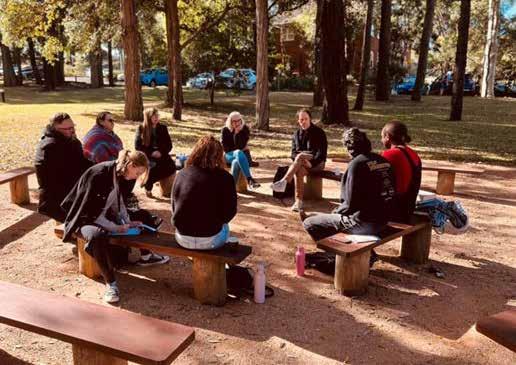
“We were a range of ages, perspectives, church backgrounds and life experiences, so there’s both challenge and richness in that, and ultimately growth,” she said. “One of the key concepts we loved hearing from Sathi was that the kin(g) dom of God is ‘moving between us’. We got a taste of that as we talked together and listened for the Spirit.”
The conference also offered a variety of electives on different topics. Steff Fenton, co-founder of New City Church, invited participants to explore the ways Jesus aligned with and subverted ancient Roman ideas of masculinity and femininity. They then offered an interpretation of Matthew 19:1-12 that affirms eunuchs as people who transgressed gendered norms in a way that reveals divinity.
Other electives included “How to Talk About the Voice to Parliament,” led by Alice Salomon and Jono Row from the Uniting Advocacy team, which equipped participants to have “effective conversations that change hearts and minds” in the lead up to the referendum
later this year. Prof. Clarke presented an elective titled “Passionately Christian and Compassionately Interreligious,” encouraging attendees to be “deeply informed by Christian sources and broadly informed by interreligious resources” in how they move through the world. Gabi Cadenhead also facilitated a workshop on “Creative Writing as a Spiritual Practice,” a welcoming space for participants to reflect on their learnings at School of Discipleship.
Saturday evening concluded with Songfest, a School of Discipleship tradition featuring a range of performances from improvised jazz to moving poetry to comedic re-enactment of Bible stories. This year’s MC Cheree Corbin described Songfest as “an act of creation.” Corbin told Insights, “If you spend a day and a half building community, the community is going to show up when you need it most. And that’s how it played out on the night – a loving, supportive community appreciating its artists.”
In place of the usual Question and Response segment of the SOD program on the Sunday afternoon, attendees were invited to participate in the first episode of the Pulsecast recorded with a live audience. Steve Molkentin from the Pulse team addressed audience questions to the keynote speakers and Rev. Janet Staines, giving those unable to attend a taste of the conference.
The weekend came to a close on the Sunday afternoon with worship, including Holy Communion and the litany of Presente, “a calling to mind of all those whose lives have been extinguished by hatred and violence, those who have died in the struggle for justice and peace.” This tradition originated in Central and Latin America, and has been a part of School of Discipleship since its inception, drawing on the “Cloud of Witnesses” who accompany us on the journey of discipleship.
School of Discipleship is made possible by the hard work of the organising team, especially Rev. Adrian SukumarWhite behind the scenes. Next year’s conference will take place on the first weekend of July 2024.
GABI CADENHEAD MISSION WORKER FOR CHRISTIAN STUDENTS UNITING AT THE UNIVERSITY OF SYDNEYWE WERE A RANGE OF AGES, PERSPECTIVES, CHURCH BACKGROUNDS AND LIFE EXPERIENCES, SO THERE’S BOTH CHALLENGE AND RICHNESS IN THAT, AND ULTIMATELY GROWTH
On 30 July, Willoughby Northbridge Uniting Church announced their extraordinary gift of $1.5 million to the Synod Growth Investment Fund. A decision not made lightly, this gift is an inspiring way to look at both and end and an opportunity for a new beginning.
For after more than 70 years of faithful service to the local community and beyond, the last service of the Castlecrag Uniting Church congregation was held on 23 December 2018. The difficult decision was taken to sell the Castlecrag Uniting Church property to help fund both mission and new ministries within the NSW Synod. This decision fell to the responsible body, the Willoughby Northbridge Uniting Church.
Carol Mason is Chairperson of the Willoughby Northbridge Uniting Church Council. “As a church we are custodians of gifts from past generations, and are called to be generous to build up God's Kingdom,” Mrs Mason said during their service.
“Our congregations of Willoughby and Northbridge wished to see that the resources bequeathed to us by the faithful members
of Castlecrag Uniting Church be used to assist in the Lord’s work in new, emerging and disadvantaged communities, where funding is much needed, our preference being South West Sydney where there are hopes of a new church plant.”
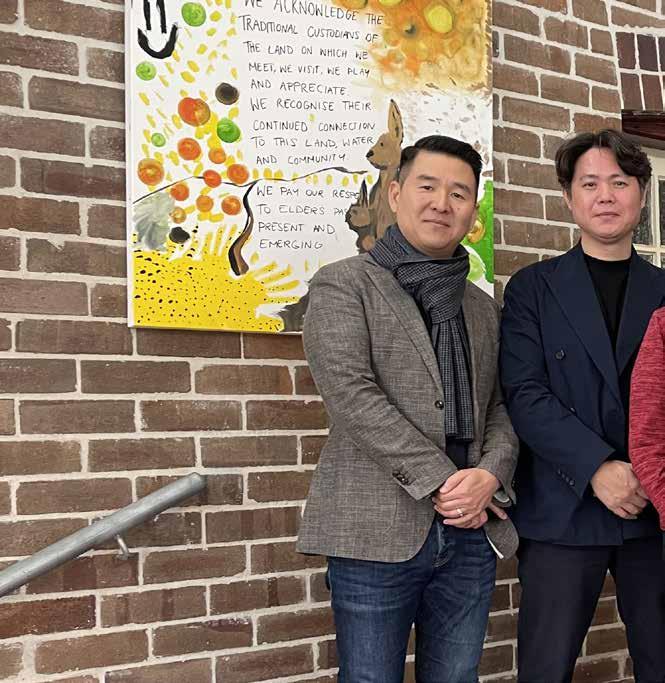
On 4 June, 2022 the Castlecrag site was sold and the closure service was held on 28 August 2022. This service was a time to celebrate what God had done and to give thanks to God for all the mission and ministry that has happened at Castlecrag Uniting Church. “It was also a time to remember that God is always doing something new as in Isaiah: ‘Behold, I am doing a new thing,” Mrs Mason continued. “It was a bittersweet time of worship and fellowship, where we sang, laughed, cried and reminisced, with the knowledge that future generations across our State and the ACT, as they seek to spread God’s Kingdom, will be blessed by Castlecrag’s careful stewardship and faithfulness over decades.”
Rev. Alan Wilson, a past minister of Northbridge-Castlecrag UC, wrote the epilogue for They shall be one' - a history of the Northbridge-Castlecrag Parish of the Uniting Church in Australia 1977 - 1987.
WE ARE CUSTODIANS OF GIFTS FROM PAST GENERATIONS, AND ARE CALLED TO BE GENEROUS TO BUILD UP GOD'S KINGDOM
This quote from the epilogue still seems very apt 36 years later: “This history is meant to help… us to realise that history does not stop nor must we. As generation follows generation we are meant to take up where others have had to leave off. We must learn to develop strongly in the arms of dedication and devotion so that a future generation will be able to look back from another vantage point and give thanks to God for the way He has seen fit to bless us and use the church family within this parish. Hitherto hath the Lord led us. Thanks be to God.”
“It is my privilege, as Chair of CMC, on behalf of the WilloughbyNorthbridge Uniting Church congregation to present $1.5 million to Luke [Lee] and Glen [Spencer] representing the Synod Growth Investment Fund, to assist in helping the Uniting Church in NSW grow in discipleship, relationship, number and impact,” said Mrs Mason.
“We recognise that Synod’s Future Directions calls us to become a contemporary, courageous and growing Churchacross all geography, cultures and generations, and we trust that the committee of the Synod Growth Investment Fund will use these funds where they are most needed to be a courageous and growing church in areas such as South West Sydney, not as blessed with resources as we are.”
Luke Lee is Director of Strategic Property. “It was a pleasure to work with the Willoughby Northbridge Church Council to
discern the missional use of their sale proceeds. We are grateful for their generosity and faithfulness as they shared their blessing and sowed into the work of the Synod of NSW and ACT in new mission fields,” Mr Lee said.

Rev. Glen Spencer is Director of Mission. “This is an inspiring example of how the common wealth of the Church can be liberated and shared, creating new opportunities for positive impact far beyond its original boundaries,” Rev. Spencer said. The Northbridge Willoughby UC community has shown that by change, listening to the call of their hearts, and acting collectively, they can transform loss into abundant growth and give rise to a vibrant future for the church.
ADRIAN DRAYTONFIND OUT MORE
Find out about the Synod Growth Investment Fund here nswact.uca.org.au/resources/synod-growthinvestment-fund
Find out about Future Directions here: nswact.uca.org.au/about-us/mission-strategy
On Sunday 16 July, the Moderator came to visit Tuggeranong Uniting Church (TUC).
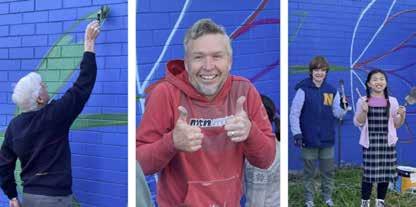
Rev. Simon Hansford preached on the parable of the seeds and the sower—or the four types of ground onto which the seeds were sown (Matt 13). In his sermon, the Moderator called this “a
work life—including the work of ministers within the church at large. In this view of work, no energy is to be expended on activity that does not produce results! Everything must be successful and achieve the desired goals; nothing should be “wasted”. He then went on to insist that we should not focus on the fear of wasting the seeds we sow through our Christian life and witness. The story is not instructing us to measure how well we are doing. Rather, he invited the Congregation to hear the story as a demonstration of how God engages with us in Christ—generously, gracefully, extravagantly— and to model our own lives as disciples on this pattern. The story encourages us to live “a discipleship of gentleness and mercy, of grace and wonder”, he said.
adorn the wall, with a set of symbols that were designed in close consultation between the artist and a small working group of the church. The mural is one way amongst many ways by which the Congregation is making connections with the local Tuggeranong community. The mural was the idea of the Rev. Elizabeth Raine, one of the ministers in placement at Tuggeranong. One of the mission groups that were established early in her ministry (in 2019) worked through the process of conceptualising the idea, fundraising to finance the mural, engaging the Congregation with the proposal, and negotiating with the artist. Some funding came from the Synod, other funding came from a community grant. The work was mostly completed just two months ago.
As a whole, the mural offers the community of the Tuggeranong Valley the symbols of the Gospel: hope and growth, an inclusive welcome and a resilient future. A large dove hovers in the sky, while rain falls to nurture the earth, symbolising the TUC commitment to environmental responsibility. The Uniting Church logo is surrounded by dots, representing a desire to seek reconciliation with First Peoples, whilst a rainbow signals the welcome extended to members of the LGBTIQA+ community, who participate both in the Rainbow Christian Alliance at TUC and in Sunday morning worship.
story of God’s grace-filled, generous extravagance; a story that subverts our expectations and invites us to listen, pay attention, and be changed”.
The Moderator contrasted the story that Jesus told with the current business focus on KPIs (key performance indicators) and the need to measure, assess, and evaluate every aspect of
After worship, the Congregation moved outside to the western wall of the church, where Geoff Filmer’s wonderful mural—hopefilled, inviting, and generous—was dedicated by the Moderator. Geoff had recently painted this mural on what was previously a huge blank brick wall, facing the street and the Erindale shopping centre. Now, vibrant primary colours
As people gathered on the grass, the Moderator prayed a blessing on the mural and the mission of the Congregation in the Tuggeranong Valley. To celebrate the occasion, members of the Congregation—young and old— joined Geoff Filmer in completing the bottom right-hand corner of the mural, painting sprouts of new growth which are now blossoming into life! The future looks bright; the seeds of God’s generous grace will continue to be sown throughout the Tuggeranong Valley.
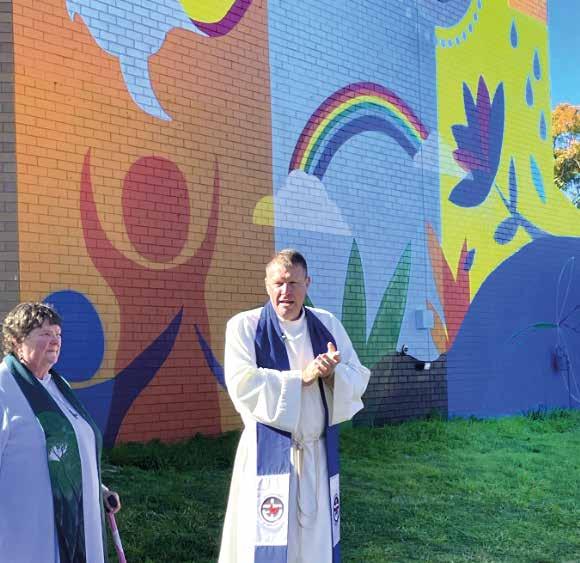 JOHN SQUIRES
EDITOR WITH LOVE TO THE WORLD
JOHN SQUIRES
EDITOR WITH LOVE TO THE WORLD
This piece originally appeared on his blog, An Informed Faith.
THE MURAL OFFERS THE SYMBOLS OF THE GOSPEL: HOPE AND GROWTH, AN INCLUSIVE WELCOME AND A RESILIENT FUTURE
0 to 90 in just 4.5 months is not impressive for car performance, but for a church that hasn’t seen children counted among their number for decades, to have ninety children attend their recent Holiday Kids Club is something to celebrate.
Rockdale Uniting Church recently ran ‘Kidsfest’ during the July school holidays, with ninety children participating in singing, dancing, games, craft, jumping on inflatables, eating and learning about Jesus.
But it was more than just the ninety children impacted by the week, it was also about a team of thirty leaders aged from 13 to 96 years working side by side.
Members of Rockdale were joined by leaders from other congregations, and through the week they clearly demonstrated what it means to be the Body of Christ. One team, one body, one purpose.
“With the average age of the UCA at 71 years of age, many congregants feel that a thriving Children’s Ministry is just not possible” Pastor Cassy Eccleston said, “but we know our God is a God of the impossible. We pray, we work hard, and we trust God will turn up”.
Supported by the Synod’s Growth Fund, Georges River Presbytery appointed Pastor Cassy Eccleston as their Emerging Generations Team Leader for their Presbytery four and a half months ago in March this year.

“Running a Holiday Kids Club is hard work, with many people playing their part. Moving this into a sustainable emerging generation ministry takes dedication, and that will be our next challenge”
Pastor Cassy said.
Pastor Cassy is one of several Emerging Generation Workers that have been

employed across the Synod through the support of the Growth Fund.
If your congregation has an interest in ministry to first third, or other missional work that could benefit from support of the Synod’s Growth Fund, please talk to your appropriate presbytery representative.
JO DRAYTON PULSETEAM LEADER
WE KNOW OUR GOD IS A GOD OF THE IMPOSSIBLE

Financial abuse of older people in Australia is more common than you may think. Here we explain how to recognise the warning signs and step in to help.
The population of people aged 65 and over is growing rapidly. By 2025 this cohort will outnumber children and by 2050 it will make up around one quarter of all Australians1
World Elder Abuse Awareness Day on 15 June recognises that greater attention needs to be paid to the specific challenges affecting older people, including in the field of human rights.
Elder abuse is a problem that exists across the world. In Australia, research2 suggests that one in six older Australians is experiencing some form of abuse, though exact numbers are hard to come by as it often goes underreported. Therefore, it is important for everyone to be able to spot the signs that it is occurring.

Elder abuse can take many forms, including psychological, physical, financial or neglect. People with poor physical or psychological health and higher levels of social isolation are the most at risk.
Financial elder abuse has increased in recent years, partly driven by older people becoming more isolated during the Covid pandemic3.
The prevalence of internet usage and online transacting has also seen a rise in the number of scams targeting elderly people. Some examples include impersonating a government department, robocalls and phone scams and computer tech support scams.
In addition, the high cost of living is leading to more cases of ‘inheritance impatience,’ where adult children feel a sense of entitlement to the assets of their parents or other family members. Older people are particularly at risk when the family member has Power of Attorney over them, as this makes it easier to manipulate or illegally manage assets.
1 Australian Bureau of Statistics: Populations Projects, Australia 2006 to 2101, 2008
2 Australian Institute of Family Studies: National Elder Abuse Prevalence Study, 2021
3 World Health Organisation: Abuse of Older People, 2022
Some signs of financial elder abuse to look out for include:

Unexplained withdrawals or transfers from bank accounts;
Suspicious looking signatures;
Confusion about where assets are held;
Not having enough money to pay bills or meet basic needs;
Expensive items such as cars and jewellery going missing;
Transfers of assets such as property;
Wills being changed suddenly.
Every Australian deserves to live a life where they feel safe and financially secure. If you have the slightest concern, it is important to ask questions and take action.
The Australian Government’s Be Connected program is designed to help older people to navigate online banking and stay safe online.
Uniting Financial Services can also assist. If you are concerned that someone may be trying to take advantage of your UFS investments or loans, call us on 1300 133 673
Examples may include someone asking for personal details such as passcodes, sending suspicious links or requesting an urgent transfer of funds from a UFS facility.
If you suspect someone with Power of Attorney has abused their powers, you can report these concerns to a lawyer or to the office of the Public Guardian in your state.
You can also get in touch with the National Elder Abuse team on 1800 353 374, which will automatically redirect you to your state or territory phone line service for free and confidential advice.
SHANNON KONG HEAD OF PARTNER SOLUTIONS AND SUPPORT, UNITING FINANCIAL SERVICESONE IN SIX OLDER AUSTRALIANS IS EXPERIENCING SOME FORM OF ABUSE
SATURDAY 4 NOV. 12PM
Sausage Sizzle and Memorabilia Display Croquet on the lawn
SUNDAY 5 NOV. 10.30AM
Anniversary Service (Lunch to follow)

Guest preacher: Rev. Oto Faiva

Please RSVP for Sunday Lunch by 21st October 2023 to Janet Clayton on 6336 1213 or 0480216541
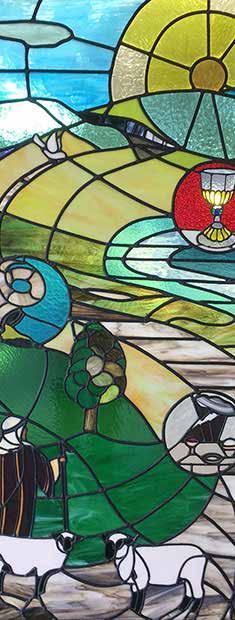
Jungian interpreter Richard Rohr describes the critical point in the male spiritual journey as the crisis when, for whatever reason, life comes crashing down around us. For Jung, such experiences are a cause for celebration, because now that the ego is stilled, transformation can occur.
And so Moses, in self-exile from the courts of Pharaoh to escape punishment for murder, finds himself confronted, in the midst of everyday work, by divine revelation. The critical point here is when Moses says “I must turn aside and look…” God, seeing that he has Moses’ full attention, now calls him by name.
Moses does not want to hear what God says next. After all, going back to confront Pharaoh would have to be about the most unsafe thing he could do. But God has the answer: “I will be with you.” The rest, as they say, is history.
In our own critical moments, “turning aside to look” can take many forms. It is in so doing that we might see something different in the everyday, and find ourselves called to a new path. For Christians, this is the Way of Jesus.

Today’s lections confront us with difficulties for a Church that turns to ancient texts to inspire and inform its spiritual life. If we claim for them literal verbal infallibility, how do we reconcile a God who slaughters innocent children with the waiting, forgiving
father of Jesus parable? And how do we understand the injunction to shun a recalcitrant church member as a “Gentile” or “Tax Collector”, when Jesus turned attitudes to such outsiders upside down?
One way through this conundrum is to read difficult texts in the wider context of biblical inspiration. We worship a God who liberates the slaves, stands up for the little ones, reconciles enemies and restores communities to wholeness. These abiding biding principles of just compassion help inform us in understanding difficult texts. Our ultimate revelation of God is Jesus Christ- known to us in Biblical witness, revealed by his presence in the community of the church, and experienced as we follow in his Way. The answers to the difficulties of life are not delivered on a plate, but shine through the struggles and complexities of the journey.
17 SEPTEMBER
Romans 13:8-14, Matthew 18:21-35
What makes a particular hill important enough to die on? Surely not issues of what one may or may not eat (though the Pharisees might have disagreed). One sign of Christian maturity is the ability to discern between that which is of relative rather than ultimate concern.
Focussing on minor differences of religious conviction can be a way of avoiding much more critical issues of faith and action. When it comes to being accountable to God, (Romans 14:12) what are the things that really matter? Is it about what is going into someone
else’s mouth, or is it what is coming out of ours? Is it about preferencing one day of the week over another, or honouring God in the everyday?
Jesus’ Parable of the Unforgiving Servant teaches that living justly as forgiven people is critical to our spiritual well-being, as well as making a big difference to the lives of others. It is also a reminder of the heart of the Gospel- “Do to others as you would have them do to you.” This is elevated groundan excellent place to take a stand!
24 SEPTEMBER
Matthew 20:1-16
Nothing seems to trigger complaints quicker than seeing others getting more than they deserve at our expense. One middle class lament in response to the May Federal Budget was ‘There is nothing in it for me”. A common argument against the Yes vote for the “Voice to Parliament” is that Aboriginal people are getting an opportunity not available to the mainstream. To the
economic rationalist and unionist alike, this parable is a nightmare.
We understand the resentment of the 9am starters at the generosity of the landowner in paying everyone the same for unequal hours worked. The demand for quality sounds like a compelling ethical argument. In fact, the Biblical imperative is equity (see Psalm 9 vs. 8), which seeks to lift the needy to a more level playing field.
Matthew does not explain why some arrive late for work. Why do we assume this to be indolence? Perhaps Jesus hopes to lift his hearers from their prejudice and sense of entitlement to a more generous spirit of caring for others, even those who cannot seem to get themselves organised! As Brendan Byrne points out, the latecomers too have a family to feed.
IN OUR OWN CRITICAL MOMENTS, “TURNING ASIDE TO LOOK” CAN TAKE MANY FORMS
1 OCTOBER
Philippians 2:1-13, Matthew 21:23-32
In response to the crude attempts of the Pharisees to discredit him, Jesus returns fire with the cutting rejoinder that the most despised people in the community are closer to God than they are.

This is consistent with the core Gospel principle of the inverting of the established order, expressed elsewhere in teaching that the first will be last, and the last first.
This theme is taken up by the writer to the Philippians, who paeon of praise describes the humility of Jesus in his earthly life and his submission to death, leading directly to his exaltation by God and the bending of every knee in acknowledgment of his Lordship.
In the face of puffed up presidents at monstrous military parades, leaders with overinflated egos demanding the submission of their neighbours and their own people, Jesus stands as the princely deflator, who exalts love and justice as the core ethical centre of decent civil society. He is saying, in effect, if you want to enter the mansions of heaven, go in through the servant’s entrance.
8 OCTOBER
Philippians 3: 1-13, Matthew 21:33-46
The Basis of Union describes the Uniting Church community of faith as “…a people on the way to the promised goal.”
Like St Paul, we know that we have not yet attained this prized destination, but we press on because we belong to Jesus Christ, and the way is his Way.
For St Paul, to change direction from his self-righteous sense of entitlement as a Jewish blueblood, to becoming a full-throated red-blooded Christian missionary took a total change of perspective as to who Jesus was. When he saw Christ with new eyes, nothing else mattered apart from righteous living that arose from faith in Christ.
The Jewish leaders who hounded Jesus were mostly unable to open their eyes to the new truth that Jesus embodied, because it threated their entitled tenancy of the vineyard of God. In the violent effort to hold the privileged space, they lost everything in the process. As Jesus says elsewhere, the tree is known
by the fruit it bears, and those who seek to saves their life will lose it
15 OCTOBER
Matthew 22:1-14, Philippians 4:1-9
This Parable, following that of the Wicked Tenants, emphasises the serious consequences of refusing the call to the ethical and celebratory life of the Kingdom; also the risks to those who represent both the vineyard owner and the father of the groom. One suspects an anti-Jewish polemic in this allegoric retelling of Luke 14:15-24, resulting in ”…an unrealistic and unbelievable story” according to Charles Cousar’s commentary in “Texts for Preaching- A Lectionary Commentary Base on the NRSV- Year A” ).
The bringing in of the poor, both good and bad, is consistent with the inclusive and expansive love of the welcoming God.
Verses 11-14 describe what seems to be an unjust punishment of the one who does not come to the banquet appropriately dressed, especially given they are apparently one of the poor of the streets. Perhaps the most generous interpretation of these difficult verses is that certain standards of behaviour apply in even the most generous, open and welcoming communities. Once inside the tent, people are responsible to strive for whatever is true, honourable, just, pure, pleasing and commendable. (see Philippians 4:8/9).
22 OCTOBER
Matthew 22:15-22; Psalm 99
It is tempting to criticise politicians for trying to avoid yes/no answers to an interviewer’s “gotcha” questions, while at the same time applauding Jesus for cleverly avoiding the Pharisees’ trap. Jesus resolves the dualistic dilemma by seeming to imply that as citizens we have certain obligations to the State, and as Christians, have other responsibilities to God. And so it seems that it is just a matter of deciding the practicalities of a split allegiance.
In fact, a dualistic response is not the answer. By asking whose image is on the imperial coin, Jesus implies that there is another image, the image of God, imprinted upon every person. As Christians, this is where our primary allegiance lies, a point not missed in
our Church’s inaugural “Statement to the Nation” of 1976 as it describes our response to the many challenges to serve the common good in the Australian community.
As Psalm 99 puts it, “The Lord is king: let the peoples tremble.” And “Extol the lord your God and worship at his holy mountain…” Everything else sorts itself out from there!
Matthew 22:34-46
So ends the series of hostile verbal interactions between Jesus and the Jewish authorities. After this, Jesus teachings take a darker tone as he condemns the crass hypocrisy of the Scribes and Pharisees, who parade in vestmented grandeur while failing to practice what they teach. He also foretells grim times of persecution and eschatological disaster.
Sadly, neither Jesus’ logic, nor reasoned biblical argument can win over such entrenched dogmatism. Driven by hate and fear, brute force will now replace heated debate, as Jesus becomes the first victim of his own dire predictions.
As Union soldier Scott reported of his efforts to help the wounded opponents in the American Civil War, ”They were lost to a narrative untethered to anything he recognised to be true- all of it ingrained so deep, beyond the reach of reasonable dialogue or evidence.
(From “Horse” by Geraldine Brooks)
The core teaching of the Jewish Faith is as simple as it is profound- love God, and your neighbour as yourself. This is not only what the Law requires, but what prophets demand (vs. 40). This love is not just piously personal, but also a consistent and extended biblical cry for justice.
Joshua 3:7-17; 1 Thessalonians 2:9-13; Matthew 23:1-12
This week’s passages are all about leadership- both the kind that sets an example for future leaders and community alike (e.g. Joshua and Paul) and that which wears out the people with petty and burdensome demands, and elevates itself in blatant contradiction to the call to serve.
The Jesus of Matthew’s Gospel has expended much energy calling the Scribes and Pharisees to account,
approaches a half-century of existence, it becomes increasingly important for us to scrutinise ourselves and evaluate our performance alongside the standards of Christ; to ensure that we are more like Joshua and Paul than the self-important legacy leaders of Jesus’ day.
12 NOVEMBER
Joshua 24:1-3a, 14-25, Matthew 25:1-13
There is nothing “Christianity lite” about the passages for this week.
Note the distinct difference in tone between the generous, compassionate and sympathetic Jesus who reaches out with inclusive love to the disadvantaged and the outcasts, and the stern admonitions that will prepare a church under persecution as they live in the expectation of Christ’s return. “In the bible, eschatology provides a framework for ethics, the context in which believers are called to right conduct” (Cousar).
Compare this to Joshua’s admonition of the Children of Israel, the tone of which is “Are you sure you are serious about following God alone, because if you get it wrong, God will slam the door in your face!”
prudence of the third servant, who takes what he considers to be a safe approach in caring for his harsh master’s money. Anyone watching the stock market recently may be inclined to applaud such discretion!
The master, however, rightly points out that even a cautious “capital guarded” approach would have been better than the equivalent of storing cash under the mattress.
What the master interprets as laziness is in fact the result of the paralysis that eventuates from fear. We could make a case here for a lesson in dealing with those under our authority with sensitivity to their strengths and weaknesses. In its eschatological context though, the point seems to be about the willingness to risk witnessing to Christ as a public expression of the Gospel. This may seem daunting to the individual, but ultimately only a special few are called to witness alone. “Therefore encourage one another and build up each other, as indeed you are doing.” (2 Thessalonians 5:11)
26 NOVEMBER
Ezekiel 34:11-16, 20-24; Matthew 25:1-13
One possible implication of the Matthew reading is ‘sheep equals good; goat equals bad’. In Ezekiel however, the distinction is between good and bad behaviour in the mixed flock. Special excoriation is reserved for those who thrive in God’s lush pastures, then carelessly trample the grass; or push and shove, butt and scatter the weaker ones. The sins being judged are greed and abuse of power.
but the agenda here, according to commentator Charles Cousar, is not so much to criticise them as to warn present and emerging church leaders to not fall into the same trap (see verses 8-12).
This call to self-examination recognises how new movements tend to be egalitarian and idealistic in their early phase, but can quickly deteriorate into a heirarchy where the inflated egos float to the top, potentially displacing the cream! As the Uniting Church

Being lazy and unprepared is a precursor to failure. Ultimate disappointment awaits those who risk missing out on the rewards in store for the wise and committed ones who watch and pray in readiness to serve at a moment’s notice. Charles Wesley’s words ring true now as much as ever- “…to serve the present age, my calling to fulfil: O may it all my powers engage to do my Master’s will!”
19 NOVEMBER
Matthew 25:14-30; 2
Thessalonians 5:1-11
Many older people who read this passage could easily identify with the
In Matthew, it is not absolutely clear if it is the nations or the people who are being judged (vs. 32). There is no doubt that some countries manage to achieve better and more generous systems than others to care for the weaker parts of their community. On balance though, it seems to be the individual who is here being held to account for their willingness to reach out to help the vulnerable, or to ignore the plight of those in special need. In the spirit of the Buffy Sainte Marie protest song “He’s the Universal Soldier and he really is to blame. His orders come from far away no more…”. Christian is as Christian does.
REV. BRIAN BROWNAS THE UNITING CHURCH APPROACHES A HALF-CENTURY OF EXISTENCE, IT BECOMES INCREASINGLY IMPORTANT FOR US TO SCRUTINISE OURSELVES AND EVALUATE OUR PERFORMANCE ALONGSIDE THE STANDARDS OF CHRIST
The new Barbie movie, directed by Greta Gerwig and starring Margot Robbie and Ryan Gosling, is a visual and thoughtprovoking feast of cinema.

float from the roof straight into the car. There is no water – but they still have showers and pools. Food is a mixture of real containers and decals – they have meals but they don’t consume anything.
Margot Robbie has been seen wearing outfits on her press tour that are inspired by Barbie dolls throughout her 64 year history.
While Barbie is a fun heroine’s journey, there is a depth of thought that has been injected into this movie that begs a closer look.
There are two things, amongst a cornucopia of concepts that this movie raises, that are worth exploring: the role of women in the modern world and the problem of patriarchy.
Inspired by the Mattel doll, created by Ruth Handler and launched in 1959, the movie follows the adventures of Stereotypical Barbie as she journeys from Barbieland to the real world to find out why she is malfunctioning. She is assisted by Ken, other Barbies, and real life “owner” Gloria and her daughter Sasha. Barbie discovers that the real world is not what she had been led to believe. Barbies were meant to inspire women, so that all issues of discrimination and feminism would be solved. Women in the real world were meant to enjoy fulfilled, perfect lives, just like in Barbieland. Instead, she finds patriarchy well and truly entrenched in America’s Los Angeles. Pointedly, she can’t solve or change that. She can, however, learn lessons on the way.
The Barbieland sets, props, and costumes are sumptuous and pay homage to real Barbie dreamhouses, accessories, and vehicles that have been available since the 1960’s. If you see it on the big screen, it really does feel like you are in a world of perfect plastic injection-moulded modernism. The Barbies interact in their world as if they are being played with. They don’t walk all the way through their multistory house to get to the garage – they
The closet is arrayed like a Barbie boxed fashion set, with the outfit and matching accessories on display. The whole outfit magically transfers to Barbie and a new outfit for the next day appears in its place. Barbie plays every role from President to garbage collector. She posts the mail and explores space, She is a doctor and a chef. She is a lawyer and an athlete. She is a Supreme Court judge and a construction worker. She is a nurse, a pilot, a builder, a teacher, and a vet. Everything is open to her and she is capable of achieving anything she puts her mind to.
The easter eggs for Barbie fans are innumerable. Look for the letter B hidden in carpet, logos and architecture. There are references to previous animated Barbie movies and television series. One Barbie is seen reading the Barbie magazine, which has been published from 1978, under different publishers. Skipper’s treehouse was a real playset. The camper, spaceship, boat, and Corvette that Barbie uses to get to and from the real world were all based on released toys. There were nods to discontinued dolls, and the controversies they sparked, like Growing Up Skipper, Earring Magic Ken, and pregnant Midge, one of Barbie’s friends.
The very first teaser trailer, which was expanded to become the opening scene, was inspired by Stanley Kubrick’s 2001: A Space Odessey, complete with Richard Strauss’ Thus Spoke Zarathustra score. It describes how girls had played with dolls since the beginning of time, but they were always baby dolls. This offered only one avenue of play – that of being mothers. Historically, there is some truth to this. The Twentieth Century Toy Museum in Carcoar describes how Barbie completely changed the world of dolls. Before Barbie, girls mostly had “daughter” dolls that they had to care for. After Barbie, girls suddenly had a big sister that they could look up to and be inspired by. Barbie offered options for what they could do with their lives that had not been seen before.
While this might be an oversimplification, the restriction on women to be solely valued in terms of their relationship to others, wife, mother, daughter, etc., is part of what feminism has strived to critique. There has been a cost for women in moving beyond the household realm. The burden of carrying the mental load, still doing the vast majority of housework while holding down work as well, impossible, and often double, standards to uphold (some of which the movie fairly critiques Barbie as representing), are things that modern women express.
The climax of the movie is arguably Gloria’s monologue after Barbie despairs that she is not pretty enough,
not smart enough to be interesting, just not good enough. The speech enables the brainwashed Barbies to be freed from the patriarchal change that Ken has brought with him from the real world. It laments the impossibility of being a woman.
“It is literally impossible to be a woman. You are so beautiful, and so smart, and it kills me that you don’t think you’re good enough. Like, we have to always be extraordinary, but somehow we’re always doing it wrong.
You have to be thin, but not too thin. And you can never say you want to be thin. You have to say you want to be healthy, but also you have to be thin. You have to have money, but you can’t ask for money because that’s crass.
You have to be a boss, but you can’t be mean. You have to lead, but you can’t squash other people’s ideas. You’re supposed to love being a mother, but don’t talk about your kids all the damn time. You have to be a career woman, but also always be looking out for other people.”
There is a moment in the film that was inspired by Michealangelo’s Creation of Adam. Barbie meets her maker, Ruth Handler, and they touch hands as Barbie receives a cup of tea while trying to escape the, ironically, all-male executive of Mattel who are trying to force her to, literally, get back in her box.
Women, the same as men, are made in the image of God. They are made to be creative, just like God is creative. They are made to be loving, just like God is love. They are made to be strong, just like God. There is no human emotion or trait that is exclusively male or female. They are human because they come from God, having been made in God’s image. Relegating any gender to roles that are limiting or oppressive goes against the nature of the created being. Humans are not their jobs, or their relationships, or their possessions, or their interests. They are images of the living, creative, powerful God, and,
as such, worthy of love, nurture, and immeasurable value.
One of the major themes of Barbie is how destructive patriarchy can be to the lives of girls and women. As Ken puts it, “Everything exists to extend the presence of men”. Barbie and he have very different experiences of rollerblading upon arriving in Los Angeles. Ken feels looked up to, seen, valued, “admired but not ogled”. He experienced respect just for who he was. Barbie, on the other hand, is uneasy, feels unsafe, and recognises an undercurrent of violence. Sadly, Barbieland is not that much better than the real world. Ken observes that they are the reverse of each other. He only has a good day when Barbie looks at him. The Kens are seen as superfluous in this world. They are not valued nor full participants in society. Barbie doesn’t even know where Ken goes at night. The Kens in Barbieland get to experience what so many women experience in the real world.
In both worlds, someone is being, at least, devalued and taken for granted, at worst, oppressed and abused.
At the very end of the movie, the creator Ruth Handler, spends time with Barbie on her own. She explains that being human is complicated and messy. People invent things like Barbie and patriarchy to deal with the uncomfortableness of being human. She’s got a point.

No human governmental system, cultural expression or national identity has ever fully valued all people, regardless of race, gender, or any other factor. Being human constructs, they are flawed.
Gloria encourages Barbie, and therefore us, that we still need to try. While there is no possible way that human beings can ever make the world perfect, they can strive to make it better. For Christians, that will possibly be best expressed by participating in what God is already doing in the world.
 DR KATHERINE GROCOTT
DR KATHERINE GROCOTT
WE HAVE TO BE EXTRAORDINARY, BUT SOMEHOW WE’RE DOING IT WRONG
Pixar’s

With its heartwarming story, richly developed characters, and stunning animation, Elemental not only delivers a captivating cinematic experience but also sheds light on the importance of unity and acceptance in an increasingly diverse world.
Set in Element City, the story opens with the residents of Fire, Water, Land and Air living together. Here, a fiery young woman, Ember Lumen (Leah Lewis), befriends a chill water dude, Wade Ripple (Mamoudou Athie). At its core, Elemental follows the journey of Ember, a fire elemental, as she navigates the challenges of embracing her identity and finding her place in a society that can sometimes be hesitant to accept newcomers. The film’s storyline expertly weaves together Ember’s personal journey with broader themes of inclusion, cultural diversity, and the strength that arises from our differences. As Ember encounters various characters from different elemental backgrounds, Pixar skilfully uses these fantastical representations to mirror the experiences of real-world migrants. Through poignant moments and heartfelt interactions, Elemental showcases the challenges faced by those who are considered “different” and highlights the importance of empathy and understanding.
Elemental explores a powerful and timely theme that resonates with audiences of all ages — the celebration of migrants and the beauty found in our differences.
What sets Elemental apart is its ability to tackle complex themes with grace and subtlety, making it accessible to audiences of all ages. Younger viewers can appreciate the vibrant animation and engaging characters, while older audiences will be touched by the film’s profound message. Pixar’s storytelling prowess shines through as they blend emotional depth with lighthearted humor, resulting in a narrative that is both entertaining and thought-provoking.
Element City appears to be a utopia, with its bright blue sky and water, calm breeze, and bountiful trees, but it’s only that way for beings composed of the other three elements. For fire people, living among water, earth, and wind is a constant challenge. What if a water person touches and extinguishes them? What if they burn an earth person’s branch arms to a crisp? What if a wind person blows out the flames on their body that sustain them? Fire people have to fight off these constant fears, as do the other three sects that live comfortably in Element City when the fire people aren’t otherwise around.
breathtaking, with fire, water, earth, and air seamlessly integrated into the fabric of the narrative with both comical and poignant results. The visual effects are awe-inspiring, enhancing the film’s magical atmosphere and immersing the audience in a fantastical realm. The city of New Harmony, with its bustling streets and diverse inhabitants, is a testament to the film’s commitment to portraying a multicultural society.
Elemental masterfully addresses the fears and misunderstandings often associated with migrants. It emphasises the importance of open-mindedness, compassion, and unity in bridging divides and building a harmonious society. The film’s message resonates deeply, urging viewers to look beyond surface differences and appreciate the richness that cultural diversity brings to our lives.
Elemental uses these chemical properties to create a strong allegory for the difficulties that migrants often face. Bernie, Cinder, their daughter Ember, and the rest of their fiery brethren are forced to live on the poorer outskirts of the city, in Fire Town and face daily struggles to fit into a world that hasn’t been designed for them or taken their needs into account.
Actress Shila Ommi plays Ember’s loving mother, Cinder, who is also Fire Town’s resident matchmaker with a natural gift to smell true love in a Fire person’s smoke. Ironically, she has been unable to find a match for her own daughter, who is next in line to take over the family convenience store run by husband, Bernie (Ronnie del Carmen). Of course Ember’s relationship with Wade Ripple is not in Cinder’s plan for her daughter – they are not compatible elements at all!
The film is directed and co-written by Peter Sohn (The Good Dinosaur), who himself is the son of Korean migrants, while Ronnie del Carmen is a Filipino immigrant and Ommi is an Iranian immigrant.
Ember, portrayed with earnestness and charm, serves as an endearing protagonist who captures the hearts of viewers. Her journey to discover her self-worth and embrace her unique abilities is relatable and inspiring, reminding us all of the strength that lies within our differences. The supporting cast is equally well-developed, each embodying their elemental powers with distinct personality traits that add depth and authenticity to the story.
Elemental employs stunning animation to bring its vibrant world to life. The attention to detail in creating the various elemental powers is
Elemental stands as a great example of Pixar’s ability to create compelling stories that transcend generations and convey messages that all ages can understand. Its celebration of migrants and the beauty of our differences is an essential message in today’s world, where inclusivity and unity are paramount. Through its well-crafted narrative, memorable characters, and breathtaking animation, the film encourages us to embrace the diversity around us with an open heart.
ADRIAN DRAYTON
Elemental is streaming on Disney from 13 September

Have we so over-spiritualised religion that it has lost its cutting edge so that it no longer “turns the world upside down” ?
Morrison argues that it has – we have. In looking at the issue of “mammon” or riches or wealth, call it what you will, Morrison challenges us to examine or rather, re-examine, our attitude to the material and see what has happened. In the West, at least, Capitalism and Christianity seem to have been married so we just assume that one goes with the other. We have made certain assumptions that have become so embedded in our culture we no longer think about them.
They are merely accepted as the norm, the way things are.
The uniqueness of this book is that Morrison just doesn’t interpret certain biblical texts to make his case but he reinforces the notion that the current way of looking at mammon is not the way it has always been. To that end he invokes the writings of some of the early Church Fathers who had much to say about this. In fact, the title of the book itself is part of a quote from St. Jerome.
Democracy, Capitalism and Christianity comprise the Holy Trinity of Western civilization. Morrison challenges that, He urges us to re-examine our bind acceptance of the prevailing attitude to the materialism we accept on the grounds that it is not the appropriate expression of the Gospel, the outworking of the teaching of Jesus at all. In fact, it is just the opposite.
He also calls upon people of the calibre of Origen, Ambrose of Milan, Cyril of Alexandria, Augustine, John Chrysostom and others to show that we have moved a long way from the expression of Christian discipleship in regard to our view of riches and wealth.
In his Introduction, Morrison writes, This book examines the anti-mammon witness of the Bible and the sayings of Early Church Fathers to argue that the witness of both point toward a Christian anti-capitalist ethic today.
The final two chapters argue for the necessity of a socioeconomic analysis
of capitalism, one that brings together the anti-mammon wisdom of the Bible and Patriarchs with Marx’s critique of capital to create a basis for Christian anti-capitalism. Morrison confesses to being a Christian Socialist, but he does not argue for socialism per se.
The book is easy to read yet very challenging in that it gets the reader to examine some of the presuppositions that are rarely considered today. To use the analogy appealed to earlier, perhaps it is time for a divorce between the Church and its Capitalist spouse. Morrison would argue that the Biblical witness and the early Church Fathers would agree.
REV. NEIL ERICKSSON RETIRED UNITING CHURCH MINISTER OF THE WORDAll Riches Come From Injustice is available now through Amazon.


A h i g h - e n e r g y c a m p f o r h i g h
s c h o o l e r s i n g r a d e s 7 - 1 1 . B i g
o n c o m m u n i t y , f u n , f o o d , a n d
J e s u s . T h e r e w i l l b e w o r s h i p ,

b i g a c t i v i t i e s , s m a l l g r o u p s ,
f r e e t i m e , a n d m o r e !
C o s t
$ 3 6 0 f o r c a m p e r s ( d i s c o u n t s f o r
“ a n d y o u a r e
C h r i s t ’ s , a n d
C h r i s t i s G o d ’ s ”
1 C o r i n t h i a n s
3 : 2 3

T h e C o l l a r o y C e n t r e
2 2 H o m e s t e a d A v e
C o l l a r o y N S W 2 0 9 7
m u l t i p l e c h i l d r e n i n t h e s a m e f a m i l y )
S p o n s o r s h i p a v a i l a b l e i f r e q u i r e d .
L I M I T E D S P O T S A V A I L A B L E !
R E G I S T E R N O W :
U Y C . U C A . O R G . A U
3 - 6 OCTOBER

S C A N M E F O R
M O R E I N F O !
